2017考研英语写作中的词性变换
英语词性转换总结与归纳

英语词性转换总结与归纳在英语语言学习中,词性转换是一项重要的知识点。
通过对词性的转换,我们可以更准确地表达信息,丰富语言表达能力,提高交流效率。
本文将对英语中常见的词性转换规则进行总结和归纳,帮助读者更好地掌握这一技巧。
名词转动词英语中名词可以通过加上适当的后缀或变化形式转换成动词。
例如,“friend”(朋友)可以转换成“befriend”(交朋友),在这个过程中,名词“friend”加上前缀“be-”变成了动词“befriend”。
动词转形容词动词也可以转换成形容词,通常通过加上“-ed”或“-ing”等后缀来实现。
比如,“excite”(激动)可以转换成“excited”(激动的),其中动词“excite”加上后缀“-ed”变成了形容词“excited”。
形容词转名词形容词也可以转换成名词,通常通过加上适当的后缀来实现。
例如,“smart”(聪明)可以转换成“smartness”(聪明),其中形容词“smart”加上后缀“-ness”变成了名词“smartness”。
名词转形容词名词也可以转换成形容词,通常通过加上适当的后缀或变化形式来实现。
比如,“power”(力量)可以转换成“powerful”(有力的),其中名词“power”加上后缀“-ful”变成了形容词“powerful”。
副词转形容词副词可以转换成形容词,通常通过加上“-ly”等后缀来实现。
例如,“quickly”(快速地)可以转换成“quick”(快速的),其中副词“quickly”去掉后缀“-ly”变成了形容词“quick”。
形容词转副词形容词也可以转换成副词,通常通过加上“-ly”等后缀来实现。
比如,“quiet”(安静的)可以转换成“quietly”(安静地),其中形容词“quiet”加上后缀“-ly”变成了副词“quietly”。
通过对上述几种常见的词性转换规则的总结和归纳,读者可以更好地掌握英语中词性转换的技巧,丰富词汇,提高语言表达能力。
词性转换总结与归纳总结
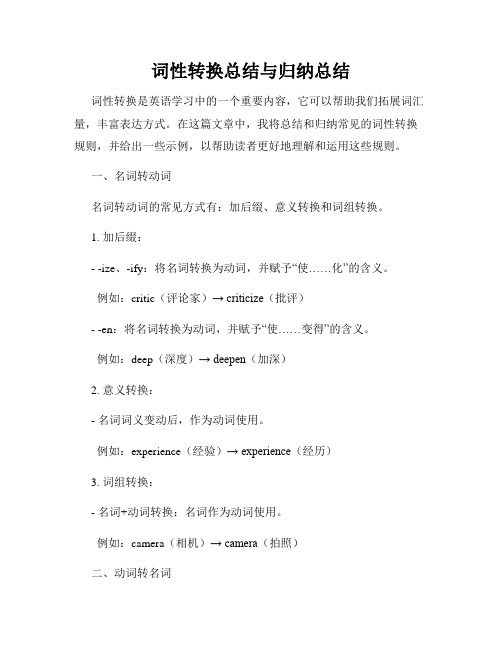
词性转换总结与归纳总结词性转换是英语学习中的一个重要内容,它可以帮助我们拓展词汇量,丰富表达方式。
在这篇文章中,我将总结和归纳常见的词性转换规则,并给出一些示例,以帮助读者更好地理解和运用这些规则。
一、名词转动词名词转动词的常见方式有:加后缀、意义转换和词组转换。
1. 加后缀:- -ize、-ify:将名词转换为动词,并赋予“使……化”的含义。
例如:critic(评论家)→ criticize(批评)- -en:将名词转换为动词,并赋予“使……变得”的含义。
例如:deep(深度)→ deepen(加深)2. 意义转换:- 名词词义变动后,作为动词使用。
例如:experience(经验)→ experience(经历)3. 词组转换:- 名词+动词转换:名词作为动词使用。
例如:camera(相机)→ camera(拍照)二、动词转名词动词转名词的主要方式有:加后缀、意义转换和短语转换。
1. 加后缀:- -tion、-ation、-ment:将动词转换为名词,并赋予“……的行为、状态或结果”的含义。
例如:experience(经历)→ experience(经验)2. 意义转换:- 动词词义变动后,作为名词使用。
例如:swim(游泳)→ swim(游泳运动)3. 短语转换:- 动词+名词转换:动词作为名词使用。
例如:run(奔跑)→ run(竞选)三、形容词转副词形容词转副词的常见方式是:加后缀。
1. 加后缀:- -ly:将形容词转换为副词。
例如:quick(快速的)→ quickly(快速地)四、副词转形容词副词转形容词的方式主要是:移出后缀和意义转换。
1. 移出后缀:- 副词的-ly后缀去掉后,即变为形容词。
例如:beautifully(优美地)→ beautiful(美丽的)2. 意义转换:- 副词的词义变动后,作为形容词使用。
例如:fast(快速地)→ fast(快的)五、形容词转名词形容词转名词的方式主要是:加不定冠词或定冠词。
英语单词词性转换的基本规律
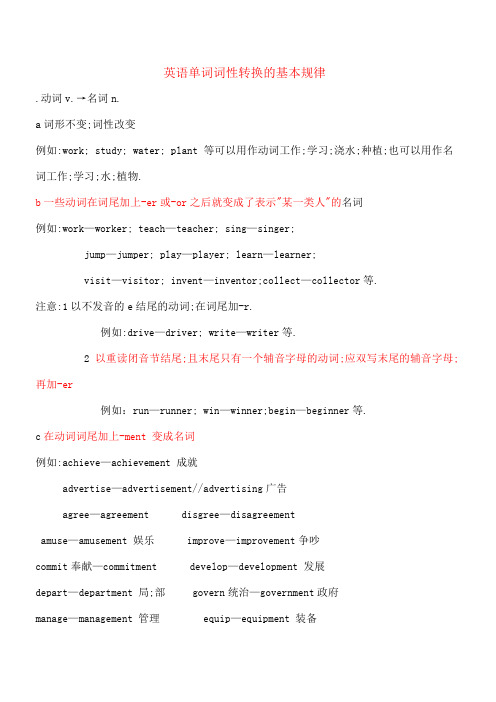
英语单词词性转换的基本规律.动词v.→名词n.a词形不变;词性改变例如:work; study; water; plant等可以用作动词工作;学习;浇水;种植;也可以用作名词工作;学习;水;植物.b一些动词在词尾加上-er或-or之后就变成了表示"某一类人"的名词例如:work—worker; teach—teacher; sing—singer;jump—jumper; play—player; learn—learner;visit—visitor; invent—inventor;collect—collector等.注意:1以不发音的e结尾的动词;在词尾加-r.例如:drive—driver; write—writer等.2以重读闭音节结尾;且末尾只有一个辅音字母的动词;应双写末尾的辅音字母;再加-er例如:run—runner; win—winner;begin—beginner等.c在动词词尾加上-ment 变成名词例如:achieve—achievement 成就advertise—advertisement//advertising广告agree—agreement disgree—disagreementamuse—amusement 娱乐 improve—improvement争吵commit奉献—commitment develop—development 发展depart—department 局;部 govern统治—government政府manage—management 管理 equip—equipment 装备有些单词比较特殊;需把动词后的e去掉再加ment.例如:argue—argument争论d在动词词尾加上-tion/sion变成名词例如: attract—attraction; instruct—instruction;invent—invention discuss—discussion;express—expression educate—education;graduate—graduation; operate—operation 去e再加"ion"compete—competition; organize—organization 把e改成其他字母再加"tion" decide—decision conclude—conclusion 把de改为s再加"ion"describe—description描写;描绘这是特例;不规则变化e在动词词尾加上-ance变成名词例如: appear—appearance 外貌;出现perform—performance 演出accept—acceptance 接受f在动词词尾加-ing变成名词方法与动词变为现在分词的方法相同例如:meet—meeting build—building wait—waiting bathe—bathing say—saying谚语 mean—meaningend —ending train —training wash—washing注意:以重读闭音节结尾;且末尾只有一个辅音字母的动词;应双写末尾的辅音字母;再加-ing如:swim—swimming shop—shopping begin—beginningg其他一些比较特殊的变化例如: Beg乞讨—beggar乞丐 behave行为举止—behaviorknow知道—knowledge知识 fly—flight 飞行heat 加热—heat热量 hit 撞击—hit 轰动一时的人或物;碰撞mix 混合—mixture混合物 press按;压—pressure压力sit坐—seat 座位 succeed—success成功tour—tour旅游/ tourist 游客2.动词v.→形容词adj.a动词后面加able;以e结尾的动词则去e加able;表示具有此性质;特点或属性.例如: afford-affordable;love-lovableb动词后面加ed;以e结尾的动词则直接加d;表示被动性的属性或特点.例如: scatter-scattered use-usedc不规则的动词则必须记忆;记住其过去分词形式.规律不大;意义同b.3.名词n.→形容词adj.a在名词后面加-y可以变成形容词尤其是一些与天气有关的名词例如: rain—rainy; cloud—cloudy; wind—windy; snow—snowy;health—healthy; luck—lucky;anger—angry guilt—guilty内疚的tourist—touristy游客多的 ; salt 盐—salty 咸的silk丝绸—silky丝绸般的; sleep—sleepy 昏昏欲睡的注意:1如果以重读闭音节结尾;且词尾只有一个辅音字母;这时应双写辅音字母再加"-y".如: sun—sunny; fun—funny; fog—foggy有雾的; fur—furry毛皮的2少数以不发音的e结尾的名词变为形容词时;应去掉e再加"-y".如: noise—noisy; ice—icy; shine—shiny发亮的; taste口味—tasty甜的b名词后面加-ed;以e结尾的直接加d.例如: spot斑点—spotted有斑点的; talent—talented 有天赋的organize—organized 有组织的; balance—balanced平衡的c一些抽象名词在词尾加-ful可以变为形容词例如:care—careful; thank—thankful; help—helpful;use—useful; meaning—meaningfuld在名词后加-less构成含有否定意义的形容词例如:care—careless粗心的; use—useless无用的hope—hopeless没希望的;home—homeless无家可归的e一些以-ce结尾的名词;把-ce改为-t变成形容词例如: difference—different; silence—silent; confidence—confidentf.在名词后加-ly变为形容词例如: friend—friendly; love—lovely; live---livelyg.在名词后加-ous变为形容词例如: danger—dangeroush名词后面加-al变为形容词例如: music—musical; medicine—medical 这个比较特殊i名词后面加-able变为形容词;如果以e结尾就去e再加"-able".例如: adjust—adjustable 可调整的 value—valuable有价值的j名词后面加-en变成形容词例如: wood—wooden 木制的 wool—woolen 羊毛的k一些表示国家的名词可以在词尾加-ese; -ish或-n构成表示国籍;语言的形容词例如:China—Chinese; Japan—Japanese; England—English;America—American; India—Indian; Australia —Australian 注意Canada—Canadian4..形容词adj.→副词adv.▲一般在形容词的词尾加-ly可以变成副词例如: quick—quickly; slow—slowly; loud—loudly; sudden—suddenly 等但是;以下几点值得注意:a 一些以"辅音字母+y"结尾的形容词;要把y改为i再加-ly例如: happy—happily; angry—angrily; lucky—luckily; heavy—heavily; noisy—noisilyb 有些以-ble或-le结尾的形容词;去掉e加-y例如:possible—possibly; terrible—terriblyc少数以e结尾的形容词;要去掉e再加-ly例如: true—truly但绝大多数以e结尾的形容词仍然直接加-ly 例如: polite—politely; wide—widely d以-l结尾的形容词变为副词时要在词尾加-ly;以-ll结尾的才在词尾只加-y.例如: usual—usually; careful—carefully; useful—usefullyfull—fully 以-ll结尾的才只加yOK;以上就是英语单词词性变化的一般规律;希望对大家有所帮助PS:有些同学可能对元音辅音以及重读闭音节不是很了解;那我在这里再做下补充说明. 1.英语26个字母中;a e i o u是元音字母; y是半元音字母; 其余都是辅音字母.★所谓半元音就是有时候做元音;有时候做辅音.半元音字母y做元音有: shy;sky做辅音比如最简单的:yes2.开音节和闭音节开音节分两种:绝对开音节和相对开音节绝对开音节指的是"元音字母结尾"的音节例如 we; hi等相对开音节是指"辅音字母-元音字母-辅音字母-不发音的e"的音节;r除外. 例如;take;make等比如:take 在这个单词中;t是辅音;a是元音;k是辅音;e是不发音的元音◆在开音节中; 元音字母发他们在字母表中的音闭音节; 则是指"辅音字母-元音字母-辅音字母"的音节 -al等除外例如:leg;cross 等◆在闭音节中;元音字母发不同的音a e i o u例 sat let sit not nut 试着读下这些单词;这些单词中;元音发的音都不是它们在字母表中发的音2.英语重读闭音节就是以辅音因素结尾的;而且是重读音节的音节.比如apple 划音节就因该是ap/ple 前面那个ap是一个音节;这个音节以辅音因素p结尾;所以就是闭音节.仅仅能看出是闭音节;是不是重读闭音节还要看这个音节是不是重读的重读闭音节三要素:1. 必须是重读音节;2. 最后只有一个辅音字母;3.元音字母发短元音说通俗点;打个比方; /u/是短元音;/u:/是长元音重读闭音节即两个辅音中间夹一个元音.如:sit---sitting begin---beginning重读在gin这个音节上●像travel这个单词;"vel"也是"辅音+元音+辅音"的结构;但是重音不在vel这个音节上;所以不用双写"l";可以为travelled;也可以是traveled;更常用的是后者.。
常见词性转换的方法
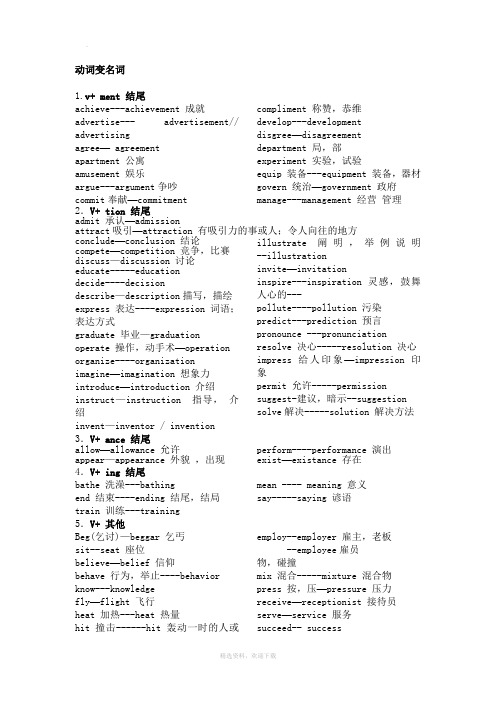
动词变名词1.v+ ment 结尾achieve---achievement 成就advertise--- advertisement// advertisingagree— agreementapartment 公寓amusement 娱乐argue---argument争吵commit奉献—commitment compliment 称赞,恭维develop---development disgree—disagreement department 局,部experiment 实验,试验equip 装备---equipment 装备,器材govern 统治—government 政府manage---management 经营管理2.V+ tion 结尾admit 承认—admissionattract吸引—attraction 有吸引力的事或人;令人向往的地方conclude—conclusion 结论compete—competition 竞争,比赛discuss—discussion 讨论educate-----educationdecide----decision describe—description描写,描绘express 表达----expression 词语;表达方式graduate 毕业—graduation operate 操作,动手术—operation organize----organization imagine—imagination 想象力introduce—introduction 介绍instruct—instruction 指导,介绍invent—inventor / invention illustrate 阐明,举例说明--illustrationinvite—invitationinspire---inspiration 灵感,鼓舞人心的---pollute----pollution 污染predict---prediction 预言pronounce ---pronunciation resolve 决心-----resolution 决心impress 给人印象—impression 印象permit 允许-----permissionsuggest-建议,暗示--suggestion solve解决-----solution 解决方法3.V+ ance 结尾allow—allowance 允许appear—appearance 外貌,出现perform----performance 演出exist—existance 存在4.V+ ing 结尾bathe 洗澡---bathingend 结束----ending 结尾,结局train 训练---training mean ---- meaning 意义say-----saying 谚语5.V+ 其他Beg(乞讨)—beggar 乞丐sit--seat 座位employ--employer 雇主,老板--employee雇员believe—belief 信仰behave 行为,举止----behavior know---knowledgefly—flight 飞行heat 加热---heat 热量hit 撞击------hit 轰动一时的人或物,碰撞mix 混合-----mixture 混合物press 按,压—pressure 压力receive—receptionist 接待员serve—service 服务succeed-- successtour 在-----旅游,在-----作巡回演出直接+地点 tour China ---tour 旅游/ tourist 游客pursue—pursuit 追求,从事propose—proposal 建议withdraw—withdrawal 取钱;收回;撤退survive—survival--survivor 幸存者arrive-- arrival到达analyze—analysis 分析名词变形容词1名词+yanger 生气-----angry honest—honesty 诚实的hunger---hungry fog—foggy有雾的fur----furry 毛皮的guilt 罪恶---guilty 内疚的health---healthyluck---luckycloud---cloudy wind—windy rain---rainysnow---snowysun—sunnytourist------touristy 游客多的business---busysalt 盐--- salty 咸的shine---shiny 发亮的silk 丝绸—silky 丝绸般的sleep---sleepy 昏昏欲睡的taste 口味,品味------tasty 甜的2.名词+ edbalance –balanced 平衡的spot 斑点,地点----spotted 有斑点的talent-----talented 有天赋的organized 有组织的distusted 厌恶的offended 生气的crowded 拥挤的polluted 被污染的pleased 高兴的3.名词+ ful/lessmeaning—meaningful 有意义的care—careful/ careless 小心的;粗心的help---helpful / helpless home—homeless 无家可归的colour---colourful pain 疼痛---painful 痛苦的use---useless/ useful thank—thankful 充满感激的peace 和平 ---- peaceful 平静的,宁静的playful 顽皮的,爱玩耍的4.名词+ ableadjustable 可调整的comfort---comfortable knowledge---knowledgeable suit 一套-----suitable 合适的5.名词+ ouscourage—courageous 勇敢的danger—dangerousmystery 神秘-----mysterious 神秘的6.ce 变 tconfidence----confident difference---different dependence—dependentindependence--independent 7. al 结尾Addition—additional 附加的,额外的Class—classical 经典的medicine 药----medical 医学的music---musicalnature---natural 自然的person---personal (私人的) nation—national 国家的education---educational有教育意义的tradition----traditional 传统的origin起源---original 新颖的;独创的grammar—grammatical 语法的globe—global 全球的8.名词+ lyfriend—friendlylive---lively 活跃的,有生气的love—lovely 可爱的9.+ en 结尾wood—wooden 木制的wool—woolen 羊毛的10. 其他energy精力---energetic strategy—strategic 战略的fool 傻子—foolish 愚蠢的freedom 自由—free 空的,免费的height 高度—highillness 疾病--- ill love—loving 慈爱的death---deadpleasure---pleasant / pleased popularity 流行性—popular pride---proudscientist----scientific 科学的形容词变副词1.形容词+ lybad—badlybright—brightly 明亮地casual—casually 随意地clear—clearly 清楚地complete—completely 完全correct---correctly 正确地final--finally fortunate—fortunately幸运地general—generally 一般来讲loud—loudlyparticular 特殊的,独特的—particularlypolite—politelyproper 合适的-,恰当的---properly main------mainly 主要地most 多数-----mostly 多半,大多数normal---normally 正常地quick—quicklyquiet—quietly 轻轻地,安静地real—reallyrecent 最近的----recently 最近;近来hard 难的;努力地---hardly 几乎不late 迟的—lately 最近;近来sad--sadlyslow---slowlyspecial—specially 专门,特殊地specific---specifically 特定地,明确地strong—strongly 坚决地,强烈地sudden—suddenly突然usual—usually2. 以le 结尾的去e + ycomfortable---comfortably gentle—gently possible---possiblysimple ----simply 仅仅;只;简单地terrible---terribly 3. 辅音字母+ y 变 ilyeasy—easilyheavy—heavilyhappy--happily4.特殊good—well好地 well 身体健康的,井true—truly形容词变名词efficient有效率的—efficiency 效率patient—patience/impatience dependent—dependenc依赖性independent—independency 独立性true—truth high—height wide—width long—lengthpossible—possibilityresponsible—responsibilityurgent—urgency 紧急prosperous—prosperity 繁荣accurate—accuracy 准确性形容词变动词modern—modernize social--socialize fast--fasten short/shorten long—lengthen—length(n.) wide--widen less--lessen strong—strengthen—strength(n.)large—enlarge名词变动词computer--computerize名词---形容词—副词beauty 美,美人—beautiful—beautifully care—careful—carefully care—careless—carelessly difference---different---differe ntly fortune—fortunate—fortunately/ unfortunately happiness—happy—happily hunger—hungry--hungrily health—healthy—healthily luck—lucky—luckily noise—noisy—noisily pride—proud—proudly骄傲地sadness—sad—sadlysafety 安全;安全的地方—safe—safelysilence—silent---silently 默默地success—successful—successfullytruth—true—truly unluck—unlucky—unluckily wonder 奇迹—wonderful—wonderfully方位的词名词—形容词East—eastern West—western South—southern North---northernIn the west of ChinaIn the western part of China四大洲名词-----形容词Asia 亚洲–---- AsianAfrica 非洲----- AfricanEurope欧洲----- EuropeanAmerica 美洲-----American既是形容词又是副词early get up early ;an early trainlate be late for classcome late for schooldeep dive deep into the seaa hole deep largehigh jump high;a high mountainhard a hard question;a hard stone work hard / study hardrain hardlong It takes too longIt takes a long timefar jump farMy home is far from school straight a straight linego straight along hereWelcome !!! 欢迎您的下载,资料仅供参考!。
英语单词词性转换的基本规律
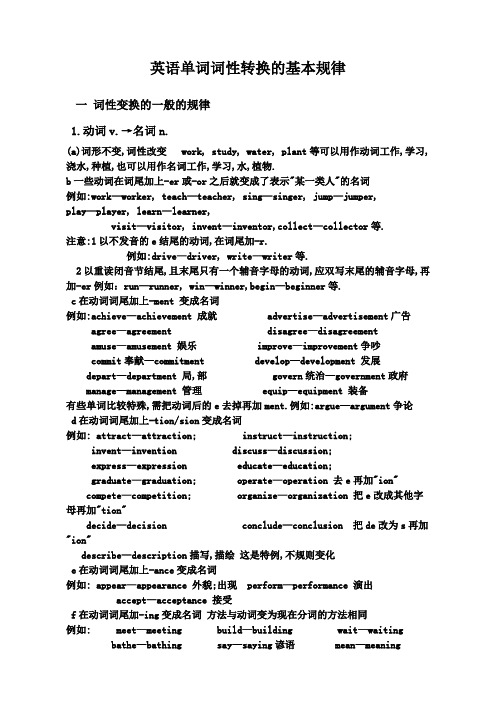
英语单词词性转换的基本规律一词性变换的一般的规律1.动词v.→名词n.(a)词形不变,词性改变 work, study, water, plant等可以用作动词工作,学习,浇水,种植,也可以用作名词工作,学习,水,植物.b一些动词在词尾加上-er或-or之后就变成了表示"某一类人"的名词例如:work—worker, teach—teacher, sing—singer, jump—jumper,play—player, learn—learner,visit—visitor, invent—inventor,collect—collector等.注意:1以不发音的e结尾的动词,在词尾加-r.例如:drive—driver, write—writer等.2以重读闭音节结尾,且末尾只有一个辅音字母的动词,应双写末尾的辅音字母,再加-er例如:run—runner, win—winner,begin—beginner等.c在动词词尾加上-ment 变成名词例如:achieve—achievement 成就 advertise—advertisement广告agree—agreement disagree—disagreementamuse—amusement 娱乐 improve—improvement争吵commit奉献—commitment develop—development 发展depart—department 局,部 govern统治—government政府manage—management 管理 equip—equipment 装备有些单词比较特殊,需把动词后的e去掉再加ment.例如:argue—argument争论d在动词词尾加上-tion/sion变成名词例如: attract—attraction; instruct—instruction;invent—invention discuss—discussion;express—expression educate—education;graduate—graduation; operate—operation 去e再加"ion"compete—competition; organize—organization 把e改成其他字母再加"tion"decide—decision conclude—conclusion 把de改为s再加"ion"describe—description描写,描绘这是特例,不规则变化e在动词词尾加上-ance变成名词例如: appear—appearance 外貌;出现 perform—performance 演出accept—acceptance 接受f在动词词尾加-ing变成名词方法与动词变为现在分词的方法相同例如: meet—meeting build—building wait—waiting bathe—bathing say—saying谚语 mean—meaningend —ending train —training wash—washing 注意:以重读闭音节结尾,且末尾只有一个辅音字母的动词,应双写末尾的辅音字母,再加-ing如:swim—swimming shop—shopping begin—beginningg其他一些比较特殊的变化例如: Beg乞讨—beggar乞丐 behave行为举止—behaviorknow知道—knowledge知识 fly—flight 飞行heat 加热—heat热量 hit 撞击—hit 轰动一时的人或物,碰撞mix 混合—mixture混合物 press按,压—pressure压力sit坐—seat 座位 succeed—success成功tour—tour旅游/ tourist 游客2.动词v.→形容词adj.a动词后面加able,以e结尾的动词则去e加able,表示具有此性质,特点或属性.例如: afford-affordable;love-lovableb动词后面加ed,以e结尾的动词则直接加d,表示被动性的属性或特点.例如: scatter-scattered use-usedc不规则的动词则必须记忆,记住其过去分词形式.规律不大,意义同b.3.名词n.→形容词adj.a在名词后面加-y可以变成形容词尤其是一些与天气有关的名词例如: rain—rainy, cloud—cloudy, wind—windy, snow—snowy,health—healthy, luck—lucky,anger—angry guilt—guilty内疚的 tourist—touristy游客多的 , salt 盐—salty 咸的silk丝绸—silky丝绸般的, sleep—sleepy 昏昏欲睡的注意:1如果以重读闭音节结尾,且词尾只有一个辅音字母,这时应双写辅音字母再加"-y". 如: sun—sunny, fun—funny, fog—foggy有雾的, fur—furry毛皮的2少数以不发音的e结尾的名词变为形容词时,应去掉e再加"-y".如: noise—noisy, ice—icy, shine—shiny发亮的, taste口味—tasty甜的b名词后面加-ed,以e结尾的直接加d.例如: spot斑点—spotted有斑点的; talent—talented 有天赋的organize—organized 有组织的; balance—balanced平衡的c一些抽象名词在词尾加-ful可以变为形容词例如:care—careful, thank—thankful, help—helpful,use—useful, meaning—meaningfuld在名词后加-less构成含有否定意义的形容词例如:care—careless粗心的, use—useless无用的hope—hopeless没希望的,home—homeless无家可归的e一些以-ce结尾的名词,把-ce改为-t变成形容词例如: difference—different, silence—silent, confidence—confidentf.在名词后加-ly变为形容词例如: friend—friendly, love—lovely, live---livelyg.在名词后加-ous变为形容词例如: danger—dangeroush名词后面加-al变为形容词例如: music—musical; medicine—medical 这个比较特殊i名词后面加-able变为形容词,如果以e结尾就去e再加"-able".例如: adjust—adjustable 可调整的 value—valuable有价值的j名词后面加-en变成形容词例如: wood—wooden 木制的 wool—woolen 羊毛的k一些表示国家的名词可以在词尾加-ese, -ish或-n构成表示国籍,语言的形容词例如:China—Chinese, Japan—Japanese, England—English,America—American, India—Indian, Australia —Australian 注意Canada—Canadian4.形容词adj.→副词adv.▲一般在形容词的词尾加-ly可以变成副词例如: quick—quickly, slow—slowly, loud—loudly, sudden—suddenly 等但是,以下几点值得注意:a 一些以"辅音字母+y"结尾的形容词,要把y改为i再加-ly例如: happy—happily, angry—angrily, lucky—luckily, heavy—heavily, noisy—noisilyb 有些以-ble或-le结尾的形容词,去掉e加-y例如:possible—possibly, terrible—terriblyc少数以e结尾的形容词,要去掉e再加-ly例如: true—truly但绝大多数以e结尾的形容词仍然直接加-ly 例如: polite—politely, wide—widelyd以-l结尾的形容词变为副词时要在词尾加-ly,以-ll结尾的才在词尾只加-y.例如: usual—usually, careful—carefully, useful—usefullyfull—fully 以-ll结尾的才只加y二 . 派生:指由一个词根加上前缀和或后缀构成另一个词的构词形式;1. 前缀:一般而言,前缀只改变词的含意,并不改变词的词性,有些前缀如en- , under- 等却使原词改变了词性,如 force n 力量— enforce v 加强;rich adj 富有—enrich v 使富裕;line n 线—underline v 在……之下画线;①表示否定意义的前缀,往往使原词变成它的反义词;前缀含义词根派生词dis- 不 like 喜欢 dislike 不喜欢un- 不 fair 公平 unfair 不公平il- 不;无 legal 合法的 illegal 非法的in- 不;非 correct 正确的 incorrect 不正确的im- 非 possible 可能的 impossible 不可能的ir- 不;非 regular 规则的 irregular 不规则的non- 无;非 smoker 烟民 non-smoker 不吸烟者en- 使 courage 勇气 encourage 鼓励fore- 前;预先 head 头 forehead 前额inter- 在……之间 national 国家的 international 国际的kilo- 千 meter 米 kilometer 千米micro- 微量的;微小的computer 计算机 microcomputer 微机mid- 在…中间 autumn 秋天 mid-autumn 中秋mis- 错误地 understand 理解 misunderstand 误解over- 在…上,过分;超过 head 头 overhead 在头顶上的re- 再;重;又 build 修建 rebuild 重建seimi- 半 circle 圆 semicircle 半圆2. 后缀:通常情况下,后缀不但改变词,还改变词性,常见的后缀有动词后缀、副词后缀、形容词后缀和名词后缀;①动词后缀:后缀含义词根派生词-en 变得… wide 宽的 widen 加宽;变宽-ify 使… beauty 美 beautify 使漂亮-ize/ise 使… real的 realize 实现②副词后缀:后缀含义词根派生词-ly 在…状态中 happy 高兴;幸福 happily 高兴地;幸福地-ward 朝…方向/地方 back 后 backward 向后;朝后③形容词后缀:后缀含义词根派生词-able/-ible 可…的;能…的 comfort 舒服 comfortable 舒适的-al/-ial 属于…的;有…特点 practice 练习 practical 实际的;可行的-ed 有…特性的 interest 兴趣 interested 感兴趣的-ful 充满…的 harm 伤害;损伤 harmful 有害的;致伤的-ish 有…属性的 self 自己 selfish 自私的-ive 有…倾向的 create 创造 creative 创造性的④名词后缀:后缀含义词根派生词-ance/-ence 指行为、状态 perform 表演 performance 演出;表演-dom 指性质、状态 free 自由的 freedom 自由-er/or 指人的身份 work 工作 worker 工人-ess 指人的身份 host 招待;主持 hostess 女主人-ese 表示国籍 China 中国 Chinese 中国人-ian 指人的身份 music 音乐 musician 音乐家-ism 与主义有关的 social 社会的 socialism 社会主义。
英语中词性之间转换的规律总结,掌握了它逢考必过

英语中词性之间转换的规律总结,掌握了它逢考必过展开全文词性之间的转换词性之间的转换,大致可以分为三种类型:一、形容词变为副词的方法:1.一些以“辅音字母+ y”结尾的形容词,要把y改为I再加-ly。
例如:Happy→happily, angry→angrily, luck→luckily, noisy→noisily 等。
2.有些以-ble或-le结尾的形容词,去掉e之后加-y。
例如:possible→possibly, terrible→terribly等。
3.大多数以e 结尾的形容词直接加-ly构成副词。
例如:polite→politely, wide→widely等。
少数以e结尾的形容词,要去掉e再加-ly。
例如:true→truly等。
注意:以l结尾的形容词变为副词时仍然要在词尾加-ly,而不是只加-ly。
除非是以-ll结构的单词才只在词尾加-ly。
例如:careful→carefully, useful→usefully, full→fully等。
二、动词变为名词的三种方式:1.词形不变,词性改变。
例如:work, study, water, plant等词既可以用作动词,也可以用作名词。
2.一些动词在词尾加上-er或-or之后就变成了表示“某一类人”的名词。
例如:work→worker, teach→teacher, run→runner, invent→inventor, visit→visitor等。
3、在动词词尾加-ing变成名词。
例如:shop→shopping, swim→swimming, write→writing, build→building等。
三、名词变为形容词的七种方式:1.在名词后面加y,可以变成形容词。
例如:rain→rainy, luck→lucky, sun→sunny, fun→funny, noise→noisy, ice→icy等。
2.一些抽象名词在词尾加-ful变为形容词。
中考英语词性大转换

中考英语词性大转换第一篇:中考英语词性大转换中考英语词性大转换动词变名词1.v+ ment 结尾develop---development achieve---achievement 成就advertise---advertisement// advertising disgree—disagreement agree—(in)agreement department 局,部apartment 公寓 experiment 实验,试验 amusement 娱乐 equip 装备---equipment 装备,器材argue---argument争吵 govern 统治—government 政府commit奉献—commitment manage---management 经营管理 compliment 称赞,恭维 2.V+ tion 结尾attract吸引—attraction 有吸引力的事或人;令人向往的地方conclude—conclusion 结论invent—inventor / invention compete—competition 竞争,比赛invite—invitationdiscuss—discussion 讨论inspire---inspiration 灵感,鼓舞人心的---educate-----educationpollute----pollution 污染 decide----decisionpredict---prediction 预言describe—description描写,描绘pronounce---pronunciationexpress 表达----expression 词语;表达方式resolve 决心-----resolution 决心 graduate 毕业—graduationpermit 允许-----permissionoperate 操作,动手术—operation suggest-建议,暗示--suggestionorganize----organizationsolve解决-----solution 解决方法instruct—instruction指导,介绍 3.V+ ance 结尾appear—appearance 外貌,出现 perform----performance 演出 4.V+ ing 结尾bathe 洗澡---bathingend 结束----ending 结尾,结局 train 训练---training5.V+ 其他Beg(乞讨)—beggar 乞丐 know---knowledge fly—flight 飞行heat 加热---heat 热量hit 撞击------hit 轰动一时的人或物,碰撞 mix 混合-----mixture 混合物名词变形容词1名词+yAnger 生气-----angry hunger---hungry fog—foggy有雾的fur----furry 毛皮的guilt 罪恶---guilty 内疚的mean----meaning 意义 say-----saying 谚语behave 行为,举止----behaviorpress 按,压—pressure 压力sit-----seat 座位succeed--successtour 在-----旅游,在-----作巡回演出直接+地点 tour China---tour 旅游/ tourist 游客health---healthy luck---lucky cloud---cloudy wind—windy rain---rainy中考英语词性大转换snow---snowy sun—sunnytourist------touristy 游客多的 business---busysalt 盐---salty 咸的 2.名词+ edbalance –balanced平衡的spot 斑点,地点----spotted 有斑点的 talent-----talented 有天赋的 organized 有组织的 distusted 厌恶的 3.名词+ ful/lessmeaning—meaningful 有意义的care—careful/ careless 小心的;粗心的 help---helpful / helplesshome—homeless 无家可归的colour---colourful 4.名词+ ableadjustable 可调整的 comfort---comfortable 5.名词+ ousenormous 巨大的 danger—dangerousmystery 神秘-----mysterious 神秘的 7.al 结尾medicine 药----medical 医学的 music---musicalnature---natural 自然的person---personal(私人的)8.名词+ ly friend—friendlylive---lively 活跃的,有生气的 love—lovely 可爱的 10.其他energy精力---energetic fool 傻子—foolish 愚蠢的freedom 自由—free 空的,免费的 height 高度—high illness 疾病---ill love—loving 慈爱的方位的词表达名词—形容词East—eastern West—westernshine---shiny 发亮的silk 丝绸—silky 丝绸般的 sleep---sleepy 昏昏欲睡的taste 口味,品味------tasty 甜的offended 生气的crowded 拥挤的polluted 被污染的pleased 高兴的pain 疼痛---painful 痛苦的 use---useless/ usefulthank—thankful 充满感激的peace 和平----peaceful平静的,宁静的 playful 顽皮的,爱玩耍的 knowledge---knowledgeable suit 一套-----suitable 合适的 6.ce 变 tconfidence----confident difference---differentnation—national 国家的education---educational有教育意义的 tradition----traditional 传统的origin起源---original 新颖的;独创的 9.+ en 结尾wood—wooden 木制的 wool—woolen 羊毛的 death---dead pleasure---pleasant / pleased popularity 流行性—popular pride---proudscientist----scientific 科学的South—southern North---northernIn the west of China In the western part of China四大洲名词-----形容词Asia 亚洲–----AsianAfrica 非洲-----AfricanEurope欧洲-----EuropeanAmerica 美洲-----American 形容词变副词 1.形容词+ lybad—badlynormal---normally 正常地bright—brightly明亮地quick—quicklycasual—casually 随意地quiet—quietly 轻轻地,安静地clear—clearly清楚地 real—reallycomplete—completely 完全 recent 最近的----recently最近;近来 correct---correctly 正确地 hard 难的;努力地---hardly 几乎不final--finallylate 迟的—lately最近;近来fortunate—fortunately幸运地sad--sadly general—generally 一般来讲 slow---slowly loud—loudlyspecial—specially 专门,特殊地particular 特殊的,独特的—particularly specific---specifically 特定地,明确地 polite—politelystrong—strongly 坚决地,强烈地proper 合适的-,恰当的---properly sudden—suddenly突然 main------mainly主要地usual—usuallymost 多数-----mostly 多半,大多数2.以le 结尾的去e + y comfortable---comfortably simple----simply 仅仅;只;简单地gentle—gently terrible---terriblypossible---possibly3.辅音字母+ y 变ily easy—easily heavy—heavily happy--happily4.特殊good—well好地well 身体健康的,井 true—truly名词---形容词—副词beauty 美,美人—beautiful—beautifully health—healthy—healthily care—careful—carefully luck—lucky—luckily care—careless—carelesslynoise—noisy—noisilydifference---different---differently pride—proud—proudly 骄傲地 happiness—happy—happily sadness—sad—sadly hunger—hungry--hungrilysafety 安全;安全的地方—safe—safelysilence—silent---silently 默默地 unluck—unlucky—unluckily success—successful—successfully wonder 奇迹—wonderful—wonderfullytruth—true—truly 既是形容词又是副词earlyget up early ;an early train latebe late for classcome late for schooldeepdive deep into the seaa hole deep largehighjump high;a high mountainharda hard question;a hard stonework hard / study hard rain hardlongIt takes too longIt takes a long timefarjump farMy home is far from schoolstraighta straight linego straight along here第二篇:中考英语词性转换归纳solve解决-----solution 解决方法动词变名词3.V+ ance 结尾1.v+ ment 结尾appear—appearance 外貌,出现achieve---achievement 成就perform----performance 演出advertise---advertisement// advertisingagree—(in)agreement 4.V+ ing 结尾apartment 公寓bathe 洗澡---bathingamusement 娱乐end 结束----ending 结尾,结局argue---argument争吵train 训练---trainingcommit奉献—commitmentmean----meaning 意义词缀变化中学归纳salt 盐---salty 咸的shine---shiny 发亮的silk 丝绸—silky 丝绸般的sleep---sleepy 昏昏欲睡的taste 口味,品味------tasty 甜的2.名词+ edbalance –balanced平衡的spot 斑点,地点----spotted 有斑点的talent-----talented 有天赋的organized 有组织的compliment 称赞,恭维develop---developmentdisgree department —disagreement experiment 局,部实验,试验equip govern 装备统治---equipment —装备,器材manage---management government经营政府管理2attract.V+ tion 吸引—结尾attraction 人有吸引力的事或conclude—conclusion 结论competediscuss——discussion competition 讨论竞争,比赛educate-----education 式decide----decisiondescribeexpress —表达description----expression 描写,描绘词语;表达方graduate 毕业—graduationoperate 操作,动手术—operationorganize----organizationinstruct—instruction指导,介绍invent—inventor / inventioninvite—invitationinspire---inspiration pollute----pollution 灵感,鼓舞人心的---predict---prediction 污染pronounce---pronunciation 预言resolvepermit suggest-允许决心建议,暗示-----permission-----resolution 决心--suggestionsay-----saying谚语5Beg(.V+behave 乞讨其他)—beggarknowfly知道行为,举止乞丐---knowledge----behaviorheat —flight 飞行知识hitmix 撞击加热------hit---heat 轰动一时的人或物,热量press 混合-----mixture 混合物碰撞sit-----seat 按,压succeed--success 座位—pressure压力tour+在-----旅游,在-----作巡回演出tourist 地点 ttour China---tour旅游直接/名词变形容词游客1Anger 名词+yhunger---hungry 生气-----angryfogfur----furry —foggy有雾的guilthealth---healthy 罪恶---guilty 毛皮的内疚的luck---luckycloud---cloudywindrain---rainy —windysnow---snowysuntourist------touristy —sunnybusiness---busy游客多的distusted offended 厌恶的crowded 生气的polluted pleased 被污染的拥挤的高兴的 3meaning.名词care—+ ful/lessmeaningful 有意义的help---helpful / helpless—careful/ careless 小心的;粗心的homecolour---colourful—homeless 无家可归的 pain use---useless/ useful疼痛---painful 痛苦的thankpeace —thankful 充满感激的playful 和平顽皮的,爱玩耍的----peaceful平静的,宁静的4 adjustable .名词+ ablecomfort---comfortable可调整的knowledge---knowledgeable suit一套-----suitable 合适的 5.enormous 名词+ ousdanger巨大的 mystery —dangerous6.ce 神秘-----mysterious 神秘的confidence----confident 变 tdifference---different7.al结尾medicine 药----medical 医学的music---musicalnature---natural 自然的person---personal私人的nation—national 国家的education---educational有教育意义的tradition----traditional 传统的origin起源---original 新颖的;独创的8.名词+ lyfriend—friendly形容词变副词1.形容词+ lybad—badlybright—brightly明亮地casual—casually 随意地clear—clearly 清楚地complete—completely 完全correct---correctly 正确地final--finallyfortunate—fortunately幸运地4.特殊good—well好地true—truly名词---形容词—副词beauty 美,美人—beautiful—beautifullycare—careful—carefullycare—careless—carelesslylive---lively 活跃的,有生气的love9.+ en —lovely 可爱的wood—结尾wooden木制的wool—woolen 羊毛的10.其他energy精力---energeticfoolfreedom 傻子—foolish 愚蠢的height 自由—free 空的,免费的illness 高度疾病—---ill highlove—loving 慈爱的death---deadpleasure---pleasant / pleased popularity 流行性—popularpride---proudscientist----scientific 科学的方位的词表达名词—形容词East—easternWestSouth——western southernNorth---northernIn the west of ChinaIn the western part of China四大洲Asia 亚洲名词–---------Asian 形容词AfricaEurope非洲欧洲-----African-----EuropeanAmerica 美洲-----Americangeneralloudparticular —loudly—generally 一般来讲politeproper —politely 特殊的,独特的—particularlymain------mainly 合适的-,恰当的most主要地---properlynormal---normally 多数-----mostly 多半,大多数quickquietreal——正常地 quietly quicklyrecent —really轻轻地,安静地hard 最近的----recentlylate 难的;努力地---hardly最近;近来几乎不sad--sadly 迟的—lately最近;近来slow---slowlyspecialspecific---specifically —specially 专门,特殊地strong特定地,明确地sudden—usual—strongly suddenly坚决地,突然强烈地2.—usuallycomfortable---comfortably 以le 结尾的去e + ygentlepossible---possibly—gentlysimple----simplyterrible---terribly 仅仅;只;简单地3.easy辅音字母+ y 变ilyheavy—easilyhappy--happily —heavilydifference---different---differently happinesshunger—happy—happily healthluck——healthyhungry--hungrily noise—pride—luckynoisy——healthily —luckily noisilysadness—proudsafety —sad——proudlysadly骄傲地silence安全;安全的地方—safe—safely success—truth—silent---silently 默默地unluck—wonder —truesuccessful—successfully unlucky—truly—奇迹—wonderfulunluckily—既是形容词又是副词wonderfully earlylateget up early ;deepbe late for class an early trainhighdive deep into the sea come late for schooljump higha hole deep large ;harda high mountaina hard questionwork hard / study hard ;a hard stonelongIt takes too long rain hardfarIt takes a long time straightMy home is far from school jump fara straight linego straight along here第三篇:词性转换Unit 1 1.lovely可爱的lively活泼的有些以-ly结尾的词是形容词,通常不是副词,常见的例子有:brotherly, sisterly, fatherly, motherly, manly, womanly, costly, deadly, friendly, unfriendly , lively, lovely, lonely, silly, ugly, likely, unlikely, 等。
写作词类转换技巧
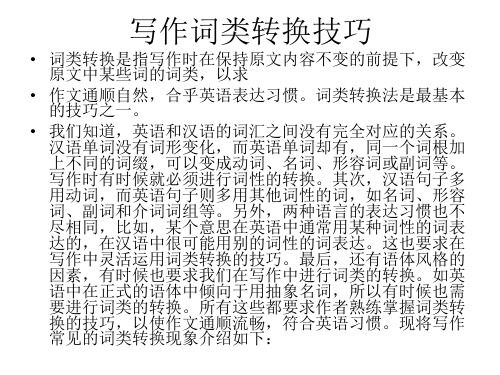
• • • • • • •
我们快到家了;马上就要到了。 We’re almost home; we’ll be there in no time. “我们连五分钟也不能耽搁了。” “不,不,我们多待一会好了!”卡茜接嘴道。 “We cannot remain five minutes longer.” “Yes, yes, we can!” replied Cathy. 以前,我总觉得有位阿姨很好笑,她每次开车去一个地方都要带上一 盒全麦饼干。 • I used to be amused by an aunt who never drove anywhere without a box of graham crackers. • 油漆未干。 • Wet paint. • 昨晚我没出去。 • I stayed at home last night. • 我一定努力学习,决不辜负父母的期望。 • I will work hard to live up to my parents’ expectation. • 我们讨论中国文化问题,不要忘记这些基本观点。 • These basic concepts must be kept in mind in our discussion of China’s cultural problems.
英语介词词组
• 英语介词词组与汉语动词之间的互相转换 • 英语介词丰富,而汉语中的介词则很少, 因此,有些动词需要转换成介词词组。 • 例如:
• • • • • • • • • •
没有植物,生命就无法延续。 Without plants, life could not go on. 机器靠电来运转。 Machines work on electricity. 她英语说得很棒,带着美国腔,却并不十分夸张。 She spoke English well with an American accent, not, though, a very exaggerated one. 中国经历了一系列艰苦的变革和试验。 China has been through a wrenching series of changes and experiments. 我再向外看时,他已抱了朱红的橘子望回走。 When next I looked out he was on his way back with some ruddy tangerines.
英语词性转换规则大全
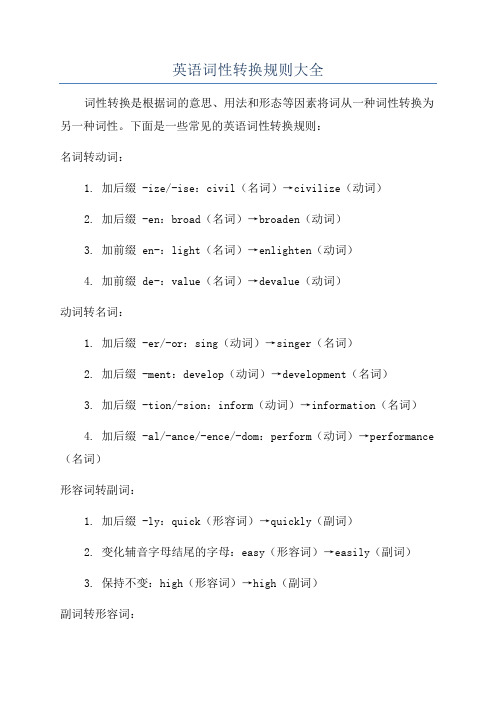
英语词性转换规则大全
词性转换是根据词的意思、用法和形态等因素将词从一种词性转换为另一种词性。
下面是一些常见的英语词性转换规则:
名词转动词:
1. 加后缀 -ize/-ise:civil(名词)→civilize(动词)
2. 加后缀 -en:broad(名词)→broaden(动词)
3. 加前缀 en-:light(名词)→enlighten(动词)
4. 加前缀 de-:value(名词)→devalue(动词)
动词转名词:
1. 加后缀 -er/-or:sing(动词)→singer(名词)
2. 加后缀 -ment:develop(动词)→development(名词)
3. 加后缀 -tion/-sion:inform(动词)→information(名词)
4. 加后缀 -al/-ance/-ence/-dom:perform(动词)→performance (名词)
形容词转副词:
1. 加后缀 -ly:quick(形容词)→quickly(副词)
2. 变化辅音字母结尾的字母:easy(形容词)→easily(副词)
3. 保持不变:high(形容词)→high(副词)
副词转形容词:
1. 去掉后缀 -ly并加后缀 -al:actively(副词)→active(形容词)
2. 去掉后缀 -ly并加后缀 -y:quickly(副词)→quick(形容词)动词转副词:
1. 加后缀 -ly:slow(动词)→slowly(副词)
2. 保持不变:run(动词)→run(副词)
以上是一些常见的英语词性转换规则,但并不是所有词都能完全按照
这些规则进行转换,还需根据具体情况灵活运用。
英语单词词性转换的基本规律

英语单词词性转换的基本规律一词性变换的一般的规律1.动词(v.)→名词(n.)(a)词形不变,词性改变work, study, water, plant等可以用作动词(工作,学习,浇水,种植),也可以用作名词(工作,学习,水,植物).(b)一些动词在词尾加上-er或-or之后就变成了表示"某一类人"的名词例如:work—worker, teach—teacher, sing—singer, jump—jumper, play—player, learn—learner, visit—visitor, invent—inventor,collect—collector等.注意:1)以不发音的e结尾的动词,在词尾加-r.例如:drive—driver, write—writer等.2)以重读闭音节结尾,且末尾只有一个辅音字母的动词,应双写末尾的辅音字母,再加-er例如:run—runner, win—winner,begin—beginner等.(c)在动词词尾加上-ment 变成名词例如:achieve—achievement (成就) advertise—advertisement(广告) agree—agreement disagree—disagreementamuse—amusement (娱乐) improve—improvement(争吵)commit(奉献)—commitment develop—development (发展)depart—department (局,部) govern(统治)—government(政府)manage—management (管理) equip—equipment (装备)有些单词比较特殊,需把动词后的e去掉再加ment.例如:argue—argument(争论)(d)在动词词尾加上-(t)ion/(s)ion变成名词例如: attract—attraction; instruct—instruction;invent—invention discuss—discussion;express—expression educate—education;graduate—graduation; operate—operation (去e再加"ion")compete—competition; organize—organization (把e改成其他字母再加"tion") decide—decision conclude—conclusion (把de改为s再加"ion")describe—description描写,描绘(这是特例,不规则变化)(e)在动词词尾加上-ance变成名词例如: appear—appearance (外貌;出现) perform—performance (演出)accept—acceptance (接受)(f)在动词词尾加-ing变成名词(方法与动词变为现在分词的方法相同)例如: meet—meeting build—building wait—waitingbathe—bathing say—saying(谚语) mean—meaningend —ending train —training wash—washing注意:以重读闭音节结尾,且末尾只有一个辅音字母的动词,应双写末尾的辅音字母,再加-ing如:swim—swimming shop—shopping begin—beginning(g)其他一些比较特殊的变化例如: Beg(乞讨)—beggar(乞丐) behave(行为举止)—behaviorknow(知道)—knowledge(知识) fly—flight (飞行)heat (加热)—heat(热量) hit (撞击)—hit( 轰动一时的人或物,碰撞)mix (混合)—mixture(混合物) press(按,压)—pressure(压力)sit(坐)—seat (座位) succeed—success(成功)tour—tour(旅游)/ tourist (游客)2.动词(v.)→形容词(adj.)(a)动词后面加able,以e结尾的动词则去e加able,表示具有此性质,特点或属性.例如: afford-affordable;love-lovable(b)动词后面加ed,以e结尾的动词则直接加d,表示被动性的属性或特点.例如: scatter-scattered use-used(c)不规则的动词则必须记忆,记住其过去分词形式.规律不大,意义同(b).3.名词(n.)→形容词(adj.)(a)在名词后面加-y可以变成形容词(尤其是一些与天气有关的名词)例如: rain—rainy, cloud—cloudy, wind—windy, snow—snowy,health—healthy, luck—lucky,anger—angry guilt—guilty(内疚的)tourist—touristy(游客多的) , salt (盐)—salty (咸的)silk(丝绸)—silky(丝绸般的), sleep—sleepy (昏昏欲睡的)注意:1)如果以重读闭音节结尾,且词尾只有一个辅音字母,这时应双写辅音字母再加"-y". 如: sun —sunny, fun—funny, fog—foggy(有雾的), fur—furry(毛皮的)2)少数以不发音的e结尾的名词变为形容词时,应去掉e再加"-y".如: noise—noisy, ice—icy, shine—shiny(发亮的), taste(口味)—tasty(甜的)(b)名词后面加-ed,以e结尾的直接加d.例如: spot(斑点)—spotted(有斑点的); talent—talented (有天赋的)organize—organized 有组织的; balance—balanced(平衡的)(c)一些抽象名词在词尾加-ful可以变为形容词例如:care—careful, thank—thankful, help—helpful,use—useful, meaning—meaningful(d)在名词后加-less构成含有否定意义的形容词例如:care—careless(粗心的), use—useless(无用的)hope—hopeless(没希望的),home—homeless(无家可归的)(e)一些以-ce结尾的名词,把-ce改为-t变成形容词例如: difference—different, silence—silent, confidence—confident(f).在名词后加-ly变为形容词例如: friend—friendly, love—lovely, live---lively(g).在名词后加-ous变为形容词例如: danger—dangerous(h)名词后面加-al变为形容词例如: music—musical; medicine—medical (这个比较特殊)(i)名词后面加-able变为形容词,如果以e结尾就去e再加"-able".例如: adjust—adjustable 可调整的value—valuable有价值的(j)名词后面加-en变成形容词例如: wood—wooden 木制的wool—woolen 羊毛的(k)一些表示国家的名词可以在词尾加-ese, -ish或-n构成表示国籍,语言的形容词例如:China—Chinese, Japan—Japanese, England—English,America—American, India—Indian, Australia —Australian (注意Canada—Canadian)4.形容词(adj.)→副词(adv.)▲一般在形容词的词尾加-ly可以变成副词例如: quick—quickly, slow—slowly, loud—loudly, sudden—suddenly 等但是,以下几点值得注意:(a) 一些以"辅音字母+y"结尾的形容词,要把y改为i再加-ly例如: happy—happily, angry—angrily, lucky—luckily, heavy—heavily, noisy—noisily(b) 有些以-ble或-le结尾的形容词,去掉e加-y例如:possible—possibly, terrible—terribly(c)少数以e结尾的形容词,要去掉e再加-ly例如: true—truly但绝大多数以e结尾的形容词仍然直接加-ly 例如: polite—politely, wide—widely(d)以-l结尾的形容词变为副词时要在词尾加-ly,以-ll结尾的才在词尾只加-y.例如: usual—usually, careful—carefully, useful—usefullyfull—fully (以-ll结尾的才只加y)二. 派生:指由一个词根加上前缀和(或)后缀构成另一个词的构词形式。
考研英语翻译之词类转换和结构转换
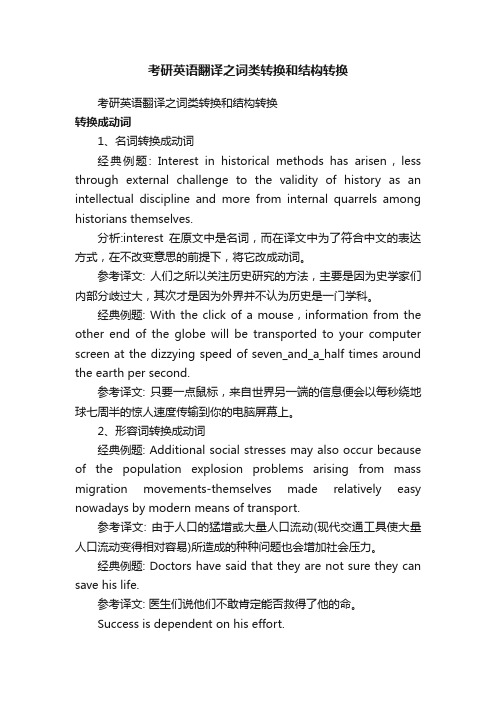
考研英语翻译之词类转换和结构转换考研英语翻译之词类转换和结构转换转换成动词1、名词转换成动词经典例题: Interest in historical methods has arisen,less through external challenge to the validity of history as an intellectual discipline and more from internal quarrels among historians themselves.分析:interest在原文中是名词,而在译文中为了符合中文的表达方式,在不改变意思的前提下,将它改成动词。
参考译文: 人们之所以关注历史研究的方法,主要是因为史学家们内部分歧过大,其次才是因为外界并不认为历史是一门学科。
经典例题: With the click of a mouse,information from the other end of the globe will be transported to your computer screen at the dizzying speed of seven_and_a_half times around the earth per second.参考译文: 只要一点鼠标,来自世界另一端的信息便会以每秒绕地球七周半的惊人速度传输到你的电脑屏幕上。
2、形容词转换成动词经典例题: Additional social stresses may also occur because of the population explosion problems arising from mass migration movements-themselves made relatively easy nowadays by modern means of transport.参考译文: 由于人口的猛增或大量人口流动(现代交通工具使大量人口流动变得相对容易)所造成的种种问题也会增加社会压力。
考研英语写作常用表达同义替换
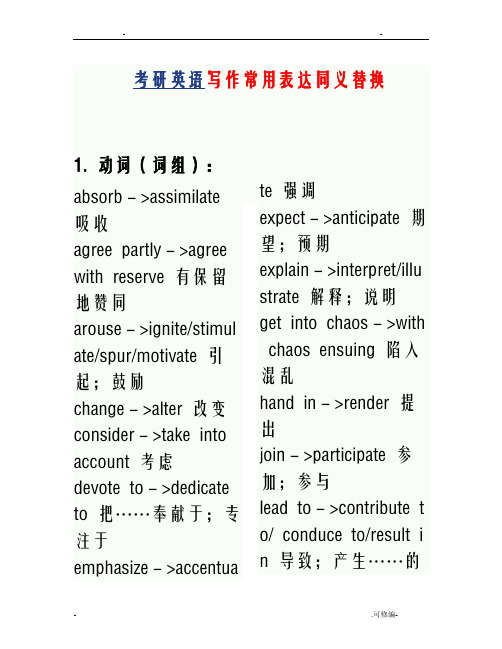
考研英语写作常用表达同义替换1. 动词(词组):absorb->assimilate 吸收agree partly->agree with reserve 有保留地赞同arouse->ignite/stimul ate/spur/motivate 引起;鼓励change->alter 改变consider->take into account 考虑devote to->dedicate to 把……奉献于;专注于emphasize->accentua te 强调expect->anticipate 期望;预期explain->interpret/illu strate 解释;说明get into chaos->with chaos ensuing 陷入混乱hand in->render 提出join->participate 参加;参与lead to->contribute t o/ conduce to/result i n 导致;产生……的结果limit->stress/hinder/h amper 限制;阻止;阻碍operate->manipulate 操作;操纵provide->lend->offe r 提供;给予publicize->propagand ize 宣传;公布繁荣(的)(词性不同,注意使用正确形式)sway->vacillate 影响;摇摆,使摇摆think->contemplate/m use/meditate/retrospect 思考;考虑;想起thrive->palmy(a.)/flou rishing(v./a.)/prosperity (n.)undermine->sap/ener vate/debilitate 破坏;使衰弱,衰竭use->employ/utilize 使用;利用want->intend to/tend to/be inclined to 希望;倾向于want to->desire 想要2. 形容词/副词:first->primarily 首先(ad.)hardly->merely->ba rely 几乎不(ad.)hurt->vulnerable 受伤的;易受攻击的inevitable-indispensa ble 必然的;不可缺少的in fact->actually/virtu ally 事实上;实际上(ad.)key->crucial/vital/con sequential 关键的;重要的large->miraculous/ma rvelous 大的;不可思议的(表程度)maybe->probably 也许;大概(ad.)more and more->inc reasing/growing 越来越多的obvious->conspicuou s 明显的;显著的old->ancient 老的;古老的proper->apposite 适当的;合适的persuasive->thorough /sound/specific/convinc ing 有说服力的true->accurate 正确的;准确的vague->gratuitous/un warranted/oversimplifie d 模糊的well-known->outstan ding 著名的3. 名词(词组):bias->prejudice/discri minate 偏见;歧视big city->metropolis 大都市chance->alternative 机会;选择character->trait/indivi duality/idiosyncrasy/pe rsonality 品质;特性;个性child->juvenile 孩子;青少年clash->conflict/collisi on/rencounter 冲突custom->convention/t radition 传统;习俗delegate->representat ive 代表detail->specific 细节lawmaking->legislatio n 立法offspring->descendan t 后代;子value->merit 价值4. 其他:although->albeit/notwithstanding 尽管(con j.)because->in that->since->seeing 因为(co nj.)but->nonetheless/nevertheless 然而;但是(c onj.)through->in term of/via 通过(prep.)to sum->to summarize/in conclusion 总之;最后1.随着经济的繁荣with the booming of the economy2.随着人民生活水平的显著提高with the re markable improvement of people's living stand ard3.先进的科学技术advanced science and te chnology4.为我们日常生活增添了情趣add much sp ice / flavor to our daily life5.人们普遍认为It is monly believed that…6.我同意前者(后者)观点I give my vote to the former / latter opinion.7.引起了广泛的公众关注Sth. has aroused wide public concern. / Sth has drawn great p ublic attention.8.不可否认It is undeniable that…9.热烈的讨论/争论a heated discussion / d ebate10.有争议性的问题a controversial issue11.就我而言/就个人而言As far as I am co ncerned, / Personally,12.有充分的理由支持be supported by sou nd reasons13.双方的论点argument on both sides14.发挥日益重要作用play an increasingly i mportant role in…15.对…必不可少be indispensable to …16.正如谚语所说As the proverb goes:17.对……产生有利/不利的影响exert positi ve / negative effects on…18.利远远大于弊The advantages far outwei gh the disadvantages.19.导致,引起lead to / give rise to / cont ribute to / result in20.复杂的社会现象a plicated social pheno menon21.责任感/成就感sense of responsibility / achievement22.竞争与合作精神sense of petition and c ooperation23.开阔眼界widen one's horizon / broaden one's vision24.学习知识和技能acquire knowledge and skills25.经济/心理负担financial burden / psychol ogical burden26.考虑到诸多因素take many factors into consideration27.从另一个角度from another perspective28.做出共同努力make joint efforts29.对……有益be beneficial to / be conduc ive to…30.为社会做贡献make contributions to the society31.打下坚实的基础lay a solid foundation f or…32.综合素质prehensive quality33.致力于/投身于be mitted / devoted to…34.应当承认Admittedly,35.不可推卸的义务unshakable duty36.满足需求satisfy / meet the needs of...37.可靠的信息源a reliable source of infor mation38.宝贵的自然资源valuable natural resourc es39.因特网the Internet (一定要有冠词,字母I大写)40.方便快捷convenient and efficient41.在人类生活的方方面面in all aspects of human life42.环保的材料environmentally friendly mate rials43.社会进步的体现a symbol of society pr ogress44.大大方便了人们的生活Sth. has greatly facilitated people's lives.45.对这一问题持有不同态度hold different attitudes towards this issue46.在一定程度上to some extent47.理论和实践相结合integrate theory with practice48.……必然趋势an irresistible trend of…49.日益激烈的社会竞争the increasingly ke en social petition50.眼前利益immediate interest/ short-term interest51.长远利益long-tem interest52.……有其自身的优缺点…has its own m erits and demerits / pros and cons53.对……有害do harm to / be harmful to / be detrimental to54.交流思想/情感/信息exchange ideas / e motions / information55.跟上…的最新发展keep pace with / kee p abreast with the latest development of…56.……的健康发展the healthy development of…57.重视attach great importance to…58.社会地位social status59.把时间和精力放在……上focus one's ti me and energy on…60.扩大知识面expand one's scope of know ledge61.身心两方面both physically and mentally62.有直接/间接关系be directly / indirectly related to…63.导致很多问题give rise to / lead to / s pell various problems64.可以替代think的词believe, claim, maint ain, argue, insist, hold the opinion / belief / view that65.缓解压力/减轻负担relieve stress / burd en66.优先考虑/发展……give (top) priority to sth.67.与……比较pared with…/ in parison wit h68.可降解的/可分解的材料degradable / de posable material69.代替replace / substitute / take the place of70.提供就业机会offer job opportunities71.反映了社会进步的mirror the social pro gress/advance72.增进相互了解enhance / promote mutual understanding73.充分利用make full use of / take advant age of74.承受更大的工作压力suffer from heavier work pressure75.保障社会稳定和繁荣guarantee the stabi lity and prosperity of our society76.更多地强调put more emphasis on…77.适应社会发展adapt oneself to the socia l development78.实现梦想realize one's dream79.主要理由列举如下The main / leading r easons are listed as follows:80.我们还有很长的路要走We still have a l ong way to go.下面给出写好一篇作文的注意事项: 1.适当用被动替换主动,这样能更客观地反映事实。
词性转换翻译

词性转换翻译词性转换是英语语法中的一个重要概念,它指的是将一个单词从一种词性转变为另一种词性。
通常,词性转换是通过添加前缀、后缀、改变词形或使用不同的词根来完成的。
下面是一些常见的词性转换及其翻译例子。
1. 名词转动词名词可以通过加上动词缀-ize或-ify转化为动词。
例如:- Noun (名词): hospital (医院)- Verb (动词): hospitalize (住院)2. 形容词转动词形容词可以通过加上动词缀-en或-ify转化为动词。
例如:- Adjective (形容词): soft (柔软的)- Verb (动词): soften (变软)3. 动词转名词动词可以通过添加名词后缀-er或-or转化为名词。
例如:- Verb (动词): sing (唱歌)- Noun (名词): singer (歌手)4. 形容词转名词形容词可以通过添加名词后缀-ness或-ity转化为名词。
例如:- Adjective (形容词): happy (快乐的)- Noun (名词): happiness (快乐)5. 名词转形容词名词可以通过添加形容词后缀-al或-ous转化为形容词。
例如:- Noun (名词): music (音乐)- Adjective (形容词): musical (音乐的)6. 动词转形容词动词可以通过添加形容词后缀-ing或-ed转化为形容词。
例如:- Verb (动词): interest (感兴趣)- Adjective (形容词): interesting (有趣)7. 名词转副词名词可以通过添加副词后缀-ly转化为副词。
例如:- Noun (名词): quick (快)- Adverb (副词): quickly (快速地)8. 形容词转副词形容词可以通过添加副词后缀-ly转化为副词。
例如:- Adjective (形容词): careful (小心的)- Adverb (副词): carefully (小心地)词性转换在英语中非常常见,掌握这些转换规则可以帮助我们更好地理解和表达英语。
英语单词词性转换的基本规律

英语单词词性转换的基本规律英语单词词性转换的基本规律一.动词(v.)→名词(n.)1词形不变,词性改变例如:work, study, water, plant等可以用作动词(工作,学习,浇水,种植),也可以用作名词(工作,学习,水,植物).2一些动词在词尾加上-er或-or之后就变成了表示"某一类人"的名词例如:work—worker, teach—teacher, sing—singer,jump—jumper, play—player, learn—learner,visit—visitor, invent—inventor,collect—collector等.注意:1)以不发音的e结尾的动词,在词尾加-r.例如:drive—driver, write—writer等.2)以重读闭音节结尾,且末尾只有一个辅音字母的动词,应双写末尾的辅音字母,再加-er 例如:run—runner, win—winner,begin—beginner等.3在动词词尾加上-ment 变成名词例如:achieve—achievement (成就) advertise—advertisement//advertising(广告) agree—agreement disgree—disagreementamuse—amusement (娱乐) improve—improvement(争吵)commit(奉献)—commitment develop—development (发展)epart—department (局,部) govern(统治)—government(政府)manage—management (管理) equip—equipment (装备)有些单词比较特殊,需把动词后的e去掉再加ment. 例如:argue—argument(争论) 4在动词词尾加上-(t)ion/(s)ion变成名词例如: attract—attraction; instruct—instruction;invent—invention discuss—discussion; express—expression educate—education; graduate—graduation; operate—operation (去e再加"ion")compete—competition; organize—organization (把e改成其他字母再加"tion") decide—decision conclude—conclusion (把de改为s再加"ion")describe—description描写,描绘 (这是特例,不规则变化)5在动词词尾加上-ance变成名词例如: appear—appearance (外貌;出现) perform—performance (演出) accept—acceptance (接受)6在动词词尾加-ing变成名词 (方法与动词变为现在分词的方法相同)例如:meet—meeting build—building wait—waitingbathe—bathing say—saying(谚语) mean—meaningend —ending train —training wash—washing注意:以重读闭音节结尾,且末尾只有一个辅音字母的动词,应双写末尾的辅音字母,再加-ing 如:swim—swimming shop—shopping begin—beginning7其他一些比较特殊的变化例如: Beg(乞讨)—beggar(乞丐) behave(行为举止)—behaviorknow(知道)—knowledge(知识) fly—flight (飞行)heat (加热)—heat(热量) hit (撞击)—hit( 轰动一时的人或物,碰撞)mix (混合)—mixture(混合物) press(按,压)—pressure(压力)sit(坐)—seat (座位) succeed—success(成功) tour—tour(旅游)/ tourist (游客)1动词后面加able,以e结尾的动词则去e加able,表示具有此性质,特点或属性.例如: afford-affordable;love-lovable2动词后面加ed,以e结尾的动词则直接加d,表示被动性的属性或特点.例如: scatter-scattered use-used2不规则的动词则必须记忆,记住其过去分词形式.规律不大,意义同(b).三.名词(n.)→形容词(adj.)1在名词后面加-y可以变成形容词(尤其是一些与天气有关的名词)例如: rain—rainy, cloud—cloudy, wind—windy, snow—snowy,health—healthy, luck—lucky,anger—angry guilt—guilty(内疚的)tourist—touristy(游客多的) , salt (盐)—salty (咸的)silk(丝绸)—silky(丝绸般的), sleep—sleepy (昏昏欲睡的)注意:1)如果以重读闭音节结尾,且词尾只有一个辅音字母,这时应双写辅音字母再加"-y". 如: sun—sunny, fun—funny, fog—foggy(有雾的), fur—furry(毛皮的)2)少数以不发音的e结尾的名词变为形容词时,应去掉e再加"-y".如: noise—noisy, ice—icy, shine—shiny(发亮的), taste(口味)—tasty(甜的)2名词后面加-ed,以e结尾的直接加d.例如: spot(斑点)—spotted(有斑点的); talent—talented (有天赋的)organize—organized 有组织的; balance—balanced(平衡的)3一些抽象名词在词尾加-ful可以变为形容词例如:care—careful, thank1—thankful, help—helpful, use—useful, meaning—meaningful 4在名词后加-less构成含有否定意义的形容词例如:care—careless(粗心的), use—useless(无用的)hope—hopeless(没希望的),home—homeless(无家可归的)5一些以-ce结尾的名词,把-ce改为-t变成形容词例如: difference—different, silence—silent, confidence—confident6.在名词后加-ly变为形容词例如: friend—friendly, love—lovely, live---lively7.在名词后加-ous变为形容词例如: danger—dangerous8名词后面加-al变为形容词例如: music—musical; medicine—medical (这个比较特殊)9名词后面加-able变为形容词,如果以e结尾就去e再加"-able".例如: adjust—adjustable 可调整的 value—valuable有价值的10名词后面加-en变成形容词例如: wood—wooden 木制的 wool—woolen 羊毛的11一些表示国家的名词可以在词尾加-ese, -ish或-n构成表示国籍,语言的形容词例如:China—Chinese, Japan—Japanese, England—English,America—American, India—Indian, Australia —Australian(注意Canada—Canadian)▲一般在形容词的词尾加-ly可以变成副词例如: quick—quickly, slow—slowly, loud—loudly, sudden—suddenly 等但是,以下几点值得注意:1一些以"辅音字母+y"结尾的形容词,要把y改为i再加-ly例如: happy—happily, angry—angrily, lucky—luckily, heavy—heavily, noisy—noisily 有些以-ble或-le结尾的形容词,去掉e加-y 例如:possible—possibly, terrible—terribly 3少数以e结尾的形容词,要去掉e再加-ly例如: true—truly但绝大多数以e结尾的形容词仍然直接加-ly例如: polite—politely, wide—widely4以-l结尾的形容词变为副词时要在词尾加-ly,以-ll结尾的才在词尾只加-y.例如: usual—usually, careful—carefully, useful—usefullyfull—fully (以-ll结尾的才只加y)PS:有些同学可能对元音辅音以及重读闭音节不是很了解,那我在这里再做下补充说明.1.英语26个字母中,a e i o u是元音字母, y是半元音字母, 其余都是辅音字母.★所谓半元音就是有时候做元音,有时候做辅音.半元音字母y做元音有: shy,sky 做辅音比如最简单的:yes2.开音节和闭音节开音节分两种:绝对开音节和相对开音节绝对开音节指的是"元音字母结尾"的音节 (例如 we, hi等)相对开音节是指"辅音字母-元音字母-辅音字母-不发音的e"的音节,(r除外). ( 例如,take,make等)比如:take (在这个单词中,t是辅音,a是元音,k是辅音,e是不发音的元音)◆在开音节中, 元音字母发他们在字母表中的音闭音节, 则是指"辅音字母-元音字母-辅音字母"的音节 ( -al等除外) (例如:leg,cross等) ◆在闭音节中,元音字母发不同的音 a e i o u例 sat let sit not nut (试着读下这些单词,这些单词中,元音发的音都不是它们在字母表中发的音)2.英语重读闭音节就是以辅音因素结尾的,而且是重读音节的音节.比如apple 划音节就因该是ap/ple 前面那个ap是一个音节,这个音节以辅音因素p结尾, 所以就是闭音节.(仅仅能看出是闭音节,是不是重读闭音节还要看这个音节是不是重读的) 重读闭音节三要素:1. 必须是重读音节;2. 最后只有一个辅音字母;3.元音字母发短元音 ( 说通俗点,打个比方, /u/是短元音,/u:/是长元音)重读闭音节即两个辅音中间夹一个元音.如:sit---sitting begin---beginning(重读在gin这个音节上)●像travel这个单词,"vel"也是"辅音+元音+辅音"的结构,但是重音不在vel这个音节上,所以不用双写"l",可以为travelled,也可以是traveled,更常用的是后者.。
英语词性转换归纳大全
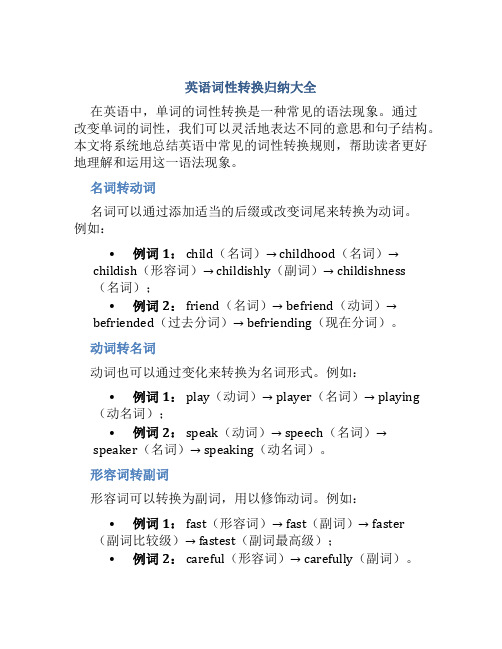
英语词性转换归纳大全在英语中,单词的词性转换是一种常见的语法现象。
通过改变单词的词性,我们可以灵活地表达不同的意思和句子结构。
本文将系统地总结英语中常见的词性转换规则,帮助读者更好地理解和运用这一语法现象。
名词转动词名词可以通过添加适当的后缀或改变词尾来转换为动词。
例如:•例词1: child(名词)→ childhood(名词)→ childish(形容词)→ childishly(副词)→ childishness(名词);•例词2: friend(名词)→ befriend(动词)→ befriended(过去分词)→ befriending(现在分词)。
动词转名词动词也可以通过变化来转换为名词形式。
例如:•例词1: play(动词)→ player(名词)→ playing (动名词);•例词2: speak(动词)→ speech(名词)→ speaker(名词)→ speaking(动名词)。
形容词转副词形容词可以转换为副词,用以修饰动词。
例如:•例词1: fast(形容词)→ fast(副词)→ faster (副词比较级)→ fastest(副词最高级);•例词2: careful(形容词)→ carefully(副词)。
副词转形容词副词可以转换为形容词,用以修饰名词。
例如:•例词1: highly(副词)→ high(形容词)→ highest(最高级形容词);•例词2: beautifully(副词)→ beautiful(形容词)。
名词转形容词名词也可以转换为形容词,用以修饰名词。
例如:•例词1: water(名词)→ watery(形容词)→ wateriest(最高级形容词);•例词2: music(名词)→ musical(形容词)→ musically(副词)。
形容词转名词形容词可以转换为名词,表示具有该特征的事物。
例如:•例词1: poor(形容词)→ the poor(名词,贫穷者);•例词2: young(形容词)→ the young(名词,年轻人)。
英语单词词性转换的基本规律
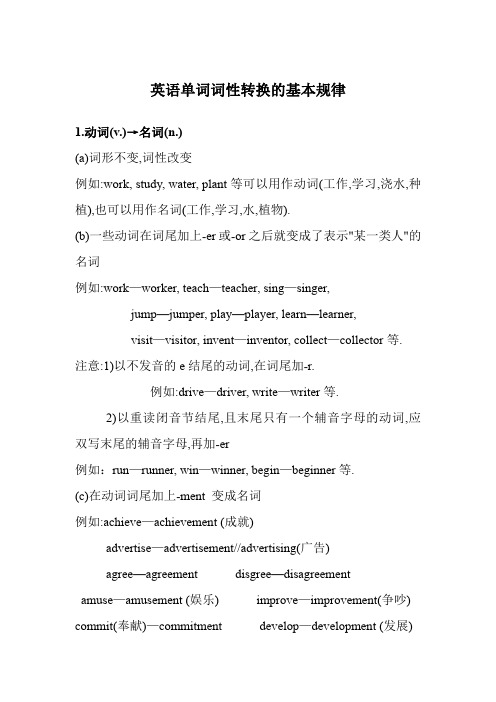
英语单词词性转换的基本规律1.动词(v.)→名词(n.)(a)词形不变,词性改变例如:work,study,water,plant等可以用作动词(工作,学习,浇水,种植),也可以用作名词(工作,学习,水,植物).(b)一些动词在词尾加上-er或-or之后就变成了表示"某一类人"的名词例如:work—worker,teach—teacher,sing—singer,jump—jumper,play—player,learn—learner,visit—visitor,invent—inventor,collect—collector等.注意:1)以不发音的e结尾的动词,在词尾加-r.例如:drive—driver,write—writer等.2)以重读闭音节结尾,且末尾只有一个辅音字母的动词,应双写末尾的辅音字母,再加-er例如:run—runner,win—winner,begin—beginner等.(c)在动词词尾加上-ment变成名词例如:achieve—achievement(成就)advertise—advertisement//advertising(广告)agree—agreement disgree—disagreement amuse—amusement(娱乐)improve—improvement(争吵) commit(奉献)—commitment develop—development(发展)depart—department(局,部)govern(统治)—government(政府) manage—management(管理)equip—equipment(装备)有些单词比较特殊,需把动词后的e去掉再加ment.例如:argue—argument(争论)(d)在动词词尾加上-(t)ion/(s)ion变成名词例如:attract—attraction;instruct—instruction;invent—invention discuss—discussion;express—expression educate—education;graduate—graduation;operate—operation(去e再加"ion") compete—competition;organize—organization(把e改成其他字母再加"tion")decide—decision conclude—conclusion(把de改为s再加"ion")describe—description描写,描绘(这是特例,不规则变化) (e)在动词词尾加上-ance变成名词例如:appear—appearance(外貌;出现)perform—performance(演出)accept—acceptance(接受)(f)在动词词尾加-ing变成名词(方法与动词变为现在分词的方法相同)例如:meet—meeting build—building wait—waitingbathe—bathing say—saying(谚语)mean—meaningend—ending train—training wash—washing注意:以重读闭音节结尾,且末尾只有一个辅音字母的动词,应双写末尾的辅音字母,再加-ing如:swim—swimming shop—shopping begin—beginning(g)其他一些比较特殊的变化例如:Beg(乞讨)—beggar(乞丐)behave(行为举止)—behaviorknow(知道)—knowledge(知识)fly—flight(飞行)heat(加热)—heat(热量)hit(撞击)—hit(轰动一时的人或物,碰撞)mix(混合)—mixture(混合物)press(按,压)—pressure(压力)sit(坐)—seat(座位)succeed—success(成功)tour—tour(旅游)/tourist(游客)2.动词(v.)→形容词(adj.)(a)动词后面加able,以e结尾的动词则去e加able,表示具有此性质,特点或属性.例如:afford-affordable;love-lovable(b)动词后面加ed,以e结尾的动词则直接加d,表示被动性的属性或特点.例如:scatter-scattered use-used(c)不规则的动词则必须记忆,记住其过去分词形式.规律不大,意义同(b).3.名词(n.)→形容词(adj.)(a)在名词后面加-y可以变成形容词(尤其是一些与天气有关的名词)例如:rain—rainy,cloud—cloudy,wind—windy,snow—snowy,health—healthy,luck—lucky,anger—angry guilt—guilty(内疚的)tourist—touristy(游客多的),salt(盐)—salty(咸的)silk(丝绸)—silky(丝绸般的),sleep—sleepy(昏昏欲睡的)注意:1)如果以重读闭音节结尾,且词尾只有一个辅音字母,这时应双写辅音字母再加"-y".如:sun—sunny,fun—funny,fog—foggy(有雾的),fur—furry(毛皮的)2)少数以不发音的e结尾的名词变为形容词时,应去掉e再加"-y".如:noise—noisy,ice—icy,shine—shiny(发亮的),taste(口味)—tasty(甜的)(b)名词后面加-ed,以e结尾的直接加d.例如:spot(斑点)—spotted(有斑点的);talent—talented(有天赋的)organize—organized有组织的;balance—balanced(平衡的)(c)一些抽象名词在词尾加-ful可以变为形容词例如:care—careful,thank—thankful,help—helpful,use—useful,meaning—meaningful(d)在名词后加-less构成含有否定意义的形容词例如:care—careless(粗心的),use—useless(无用的)hope—hopeless(没希望的),home—homeless(无家可归的) (e)一些以-ce结尾的名词,把-ce改为-t变成形容词例如:difference—different,silence—silent,confidence—confident (f).在名词后加-ly变为形容词例如:friend—friendly,love—lovely,live---lively(g).在名词后加-ous变为形容词例如:danger—dangerous(h)名词后面加-al变为形容词例如:music—musical;medicine—medical(这个比较特殊) (i)名词后面加-able变为形容词,如果以e结尾就去e再加"-able".例如:adjust—adjustable可调整的value—valuable有价值的(j)名词后面加-en变成形容词例如:wood—wooden木制的wool—woolen羊毛的(k)一些表示国家的名词可以在词尾加-ese,-ish或-n构成表示国籍,语言的形容词例如:China—Chinese,Japan—Japanese,England—English,America—American,India—Indian,Australia —Australian(注意Canada—Canadian)4..形容词(adj.)→副词(adv.)▲一般在形容词的词尾加-ly可以变成副词例如:quick—quickly,slow—slowly,loud—loudly,sudden—suddenly等但是,以下几点值得注意:(a)一些以"辅音字母+y"结尾的形容词,要把y改为i再加-ly例如:happy—happily,angry—angrily,lucky—luckily,heavy—heavily,noisy—noisily(b)有些以-ble或-le结尾的形容词,去掉e加-y例如:possible—possibly,terrible—terribly(c)少数以e结尾的形容词,要去掉e再加-ly例如:true—truly但绝大多数以e结尾的形容词仍然直接加-ly例如:polite—politely,wide—widely(d)以-l结尾的形容词变为副词时要在词尾加-ly,以-ll结尾的才在词尾只加-y.例如:usual—usually,careful—carefully,useful—usefullyfull—fully(以-ll结尾的才只加y)OK,以上就是英语单词词性变化的一般规律,希望对大家有所帮助PS:有些同学可能对元音辅音以及重读闭音节不是很了解,那我在这里再做下补充说明.1.英语26个字母中,a e i o u是元音字母,y是半元音字母,其余都是辅音字母.★所谓半元音就是有时候做元音,有时候做辅音.半元音字母y做元音有:shy,sky做辅音比如最简单的:yes2.开音节和闭音节开音节分两种:绝对开音节和相对开音节绝对开音节指的是"元音字母结尾"的音节(例如we,hi等)相对开音节是指"辅音字母-元音字母-辅音字母-不发音的e"的音节,(r除外).(例如,take,make等)比如:take(在这个单词中,t是辅音,a是元音,k是辅音,e是不发音的元音)◆在开音节中,元音字母发他们在字母表中的音闭音节,则是指"辅音字母-元音字母-辅音字母"的音节(-al等除外)(例如:leg,cross等)◆在闭音节中,元音字母发不同的音a e i o u例sat let sit not nut(试着读下这些单词,这些单词中,元音发的音都不是它们在字母表中发的音)2.英语重读闭音节就是以辅音因素结尾的,而且是重读音节的音节.比如apple划音节就因该是ap/ple前面那个ap是一个音节,这个音节以辅音因素p结尾,所以就是闭音节.(仅仅能看出是闭音节,是不是重读闭音节还要看这个音节是不是重读的)重读闭音节三要素:1.必须是重读音节;2.最后只有一个辅音字母;3.元音字母发短元音(说通俗点,打个比方,/u/是短元音,/u:/是长元音)重读闭音节即两个辅音中间夹一个元音.如:sit---sitting begin---beginning(重读在gin这个音节上)●像travel这个单词,"vel"也是"辅音+元音+辅音"的结构,但是重音不在vel这个音节上,所以不用双写"l",可以为travelled,也可以是traveled,更常用的是后者.。
考研英语翻译技巧之词性转换

(考研)英语翻译技巧之词性转换一、转译成动词例如:I admire your decision to fight for the difficulties in preparing the examination.译文:你决定战胜复习考试中的困难,这一点我很羡慕。
(一)名词转译成动词1.由动词派生的名词转译成动词。
Rockets have found application for the exploration of the universe.火箭已经用来探索宇宙。
In China, there is a lot of emphasis on politeness.在中国,人们非常注重讲礼貌。
2.含有动作意味的名词往往可以转译成动词。
A careful stud y of the original text will give you a better translation. 仔细研究原文,你会翻译得更好。
The sight and sound of our jet planes filled me with special longing.看到我们的喷气式飞机,听见隆隆的机声,令我特别神往。
3.英语中有些加后缀-er的名词, He is a good singer.他唱歌唱得好。
Those small factories are also lavish consumer and waster of raw materials. 那些小工厂还在极大的消耗和浪费原材料。
4.有些短语中作为中心主体词的名词往往可转译成动词,如To have a rest 和To have a good look at 里的rest 和look.You must be tired. Why don’t you take a rest?你一定很累了,为什么不休息一会呢?The car braked sharply, coming to rest on the edge of the cliff.汽车猛的刹住,停在悬崖边上。
英语单词词性转换的基本规律
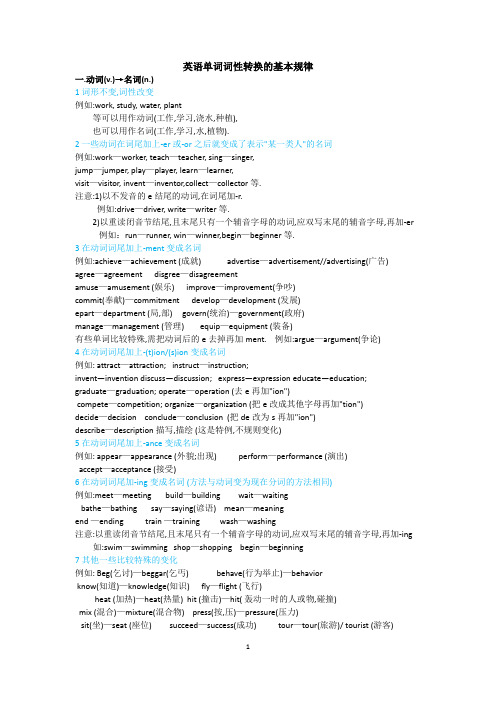
英语单词词性转换的基本规律一.动词(v.)→名词(n.)1词形不变,词性改变例如:work, study, water, plant等可以用作动词(工作,学习,浇水,种植),也可以用作名词(工作,学习,水,植物).2一些动词在词尾加上-er或-or之后就变成了表示"某一类人"的名词例如:work—worker, teach—teacher, sing—singer,jump—jumper, play—player, learn—learner,visit—visitor, invent—inventor,collect—collector等.注意:1)以不发音的e结尾的动词,在词尾加-r.例如:drive—driver, write—writer等.2)以重读闭音节结尾,且末尾只有一个辅音字母的动词,应双写末尾的辅音字母,再加-er例如:run—runner, win—winner,begin—beginner等.3在动词词尾加上-ment 变成名词例如:achieve—achievement (成就) advertise—advertisement//advertising(广告) agree—agreement disgree—disagreementamuse—amusement (娱乐) improve—improvement(争吵)commit(奉献)—commitment develop—development (发展)epart—department (局,部) govern(统治)—government(政府) manage—management (管理) equip—equipment (装备)有些单词比较特殊,需把动词后的e去掉再加ment. 例如:argue—argument(争论)4在动词词尾加上-(t)ion/(s)ion变成名词例如: attract—attraction; instruct—instruction;invent—invention discuss—discussion; express—expression educate—education; graduate—graduation; operate—operation (去e再加"ion")compete—competition; organize—organization (把e改成其他字母再加"tion") decide—decision conclude—conclusion (把de改为s再加"ion") describe—description描写,描绘 (这是特例,不规则变化)5在动词词尾加上-ance变成名词例如: appear—appearance (外貌;出现) perform—performance (演出)accept—acceptance (接受)6在动词词尾加-ing变成名词 (方法与动词变为现在分词的方法相同)例如:meet—meeting build—building wait—waitingbathe—bathing say—saying(谚语) mean—meaningend —ending train —training wash—washing注意:以重读闭音节结尾,且末尾只有一个辅音字母的动词,应双写末尾的辅音字母,再加-ing 如:swim—swimming shop—shopping begin—beginning7其他一些比较特殊的变化例如: Beg(乞讨)—beggar(乞丐) behave(行为举止)—behaviorknow(知道)—knowledge(知识) fly—flight (飞行)heat (加热)—heat(热量) hit (撞击)—hit( 轰动一时的人或物,碰撞)mix (混合)—mixture(混合物) press(按,压)—pressure(压力)sit(坐)—seat (座位) succeed—success(成功) tour—tour(旅游)/ tourist (游客)1动词后面加able,以e结尾的动词则去e加able,表示具有此性质,特点或属性.例如: afford-affordable;love-lovable2动词后面加ed,以e结尾的动词则直接加d,表示被动性的属性或特点.例如: scatter-scattered use-used2不规则的动词则必须记忆,记住其过去分词形式.规律不大,意义同(b).三.名词(n.)→形容词(adj.)1在名词后面加-y可以变成形容词(尤其是一些与天气有关的名词)例如: rain—rainy, cloud—cloudy, wind—windy, snow—snowy,health—healthy, luck—lucky,anger—angry guilt—guilty(内疚的)tourist—touristy(游客多的) , salt (盐)—salty (咸的)silk(丝绸)—silky(丝绸般的), sleep—sleepy (昏昏欲睡的)注意:1)如果以重读闭音节结尾,且词尾只有一个辅音字母,这时应双写辅音字母再加"-y".如: sun—sunny, fun—funny, fog—foggy(有雾的), fur—furry(毛皮的)2)少数以不发音的e结尾的名词变为形容词时,应去掉e再加"-y".如: noise—noisy, ice—icy, shine—shiny(发亮的), taste(口味)—tasty(甜的)2名词后面加-ed,以e结尾的直接加d.例如: spot(斑点)—spotted(有斑点的); talent—talented (有天赋的)organize—organized 有组织的; balance—balanced(平衡的)3一些抽象名词在词尾加-ful可以变为形容词例如:care—careful, thank1—thankful, help—helpful, use—useful, meaning—meaningful 4在名词后加-less构成含有否定意义的形容词例如:care—careless(粗心的), use—useless(无用的)hope—hopeless(没希望的),home—homeless(无家可归的)5一些以-ce结尾的名词,把-ce改为-t变成形容词例如: difference—different, silence—silent, confidence—confident6.在名词后加-ly变为形容词例如: friend—friendly, love—lovely, live---lively7.在名词后加-ous变为形容词例如: danger—dangerous8名词后面加-al变为形容词例如: music—musical; medicine—medical (这个比较特殊)9名词后面加-able变为形容词,如果以e结尾就去e再加"-able".例如: adjust—adjustable 可调整的 value—valuable有价值的10名词后面加-en变成形容词例如: wood—wooden 木制的 wool—woolen 羊毛的11一些表示国家的名词可以在词尾加-ese, -ish或-n构成表示国籍,语言的形容词例如:China—Chinese, Japan—Japanese, England—English,America—American, India—Indian, Australia —Australian(注意Canada—Canadian)▲一般在形容词的词尾加-ly可以变成副词例如: quick—quickly, slow—slowly, loud—loudly, sudden—suddenly 等但是,以下几点值得注意:1一些以"辅音字母+y"结尾的形容词,要把y改为i再加-ly例如: happy—happily, angry—angrily, lucky—luckily, heavy—heavily, noisy—noisily有些以-ble或-le结尾的形容词,去掉e加-y例如:possible—possibly, terrible—terribly3少数以e结尾的形容词,要去掉e再加-ly例如: true—truly但绝大多数以e结尾的形容词仍然直接加-ly例如: polite—politely, wide—widely4以-l结尾的形容词变为副词时要在词尾加-ly,以-ll结尾的才在词尾只加-y.例如: usual—usually, careful—carefully, useful—usefullyfull—fully (以-ll结尾的才只加y)PS:有些同学可能对元音辅音以及重读闭音节不是很了解,那我在这里再做下补充说明. 1.英语26个字母中,a e i o u是元音字母, y是半元音字母, 其余都是辅音字母.★所谓半元音就是有时候做元音,有时候做辅音.半元音字母y做元音有: shy,sky 做辅音比如最简单的:yes2.开音节和闭音节开音节分两种:绝对开音节和相对开音节绝对开音节指的是"元音字母结尾"的音节 (例如 we, hi等)相对开音节是指"辅音字母-元音字母-辅音字母-不发音的e"的音节,(r除外). ( 例如,take,make 等)比如:take (在这个单词中,t是辅音,a是元音,k是辅音,e是不发音的元音)◆在开音节中, 元音字母发他们在字母表中的音闭音节, 则是指"辅音字母-元音字母-辅音字母"的音节 ( -al等除外) (例如:leg,cross等)◆在闭音节中,元音字母发不同的音 a e i o u例 sat let sit not nut (试着读下这些单词,这些单词中,元音发的音都不是它们在字母表中发的音)2.英语重读闭音节就是以辅音因素结尾的,而且是重读音节的音节.比如apple 划音节就因该是ap/ple 前面那个ap是一个音节,这个音节以辅音因素p结尾,所以就是闭音节.(仅仅能看出是闭音节,是不是重读闭音节还要看这个音节是不是重读的) 重读闭音节三要素:1. 必须是重读音节;2. 最后只有一个辅音字母;3.元音字母发短元音 ( 说通俗点,打个比方, /u/是短元音,/u:/是长元音)重读闭音节即两个辅音中间夹一个元音.如:sit---sitting begin---beginning(重读在gin这个音节上)●像travel这个单词,"vel"也是"辅音+元音+辅音"的结构,但是重音不在vel这个音节上,所以不用双写"l",可以为travelled,也可以是traveled,更常用的是后者.。
[中考英语]词性转换规则及例子
![[中考英语]词性转换规则及例子](https://img.taocdn.com/s3/m/a5707053ff00bed5b9f31df1.png)
词性转换规则?动词变名词1. V+ ment 结尾Achieve—achievement 成就 advertise— advertisement/ advertising广告/广告业 agree— (in )agreement 同意 apart—apartment 公寓amuse—amusement 娱乐 argue—argument 争吵commit—commitment 奉献 comply—compliment 称赞,恭维 develop—development 发展 disagree—disagreement 分歧,争论 depart—department 局,部 experience—experiment 实验,试验 equip 配备—equipment 装备,器材 govern 统治—government 政府 manage—management 经营管理2(V+ ion 结尾attract吸引—attraction 有吸引力的事或人;令人向往的地方decide—decision 决定 conclude—conclusion 结论describe—description描写,描绘 compete—competition 竞争,比赛discuss—discussion 讨论 express表达—expression表达方式 educate—education教育 graduate—graduation毕业 operate 操作,动手术—operation 手术 organize—organization 组织,团体 instruct—instruction 指导,介绍invent—inventor / invention发明者 / 发明 permit —permission允许inspire—inspiration灵感,鼓舞人心的(物) pollute—pollution 污染predict—prediction 预言pronounce —pronunciation发音,读音 suggest—suggestion 建议,invite—invitation 邀请 dissolve—dissolvent 溶剂 solve解决—solution 解决方法 resolve 解决—resolution 决议,决心 opposite3(V+ ance 结尾appear—appearance 外貌,出现 perform—performance 演出differ相异—difference 不同点 import—importance 重要性4(V+ ing 结尾bathe 洗澡—bathing 游泳 end 结束—ending 结尾,结局 train 训练—training 训练,培训 mean — meaning 意义 say—saying 谚语 jog — jogging 慢跑 spell —spelling 拼写 write—writing 写作5(V+ 其他beg乞讨— beggar 乞丐 behave—behavior行为,举止 know—knowledge知识 fly—flight 飞行 heat 加热—heat 热量 hit 撞击—hit 轰动一时的人或物,碰撞 mix 混合—mixture 混合物 press 按,压—pressure 压力 sit—seat 座位 succeed—success成功 tour 在???旅游,在???作巡回演出(直接+地点tour China)—tour 旅游/ tourist 游客?形容词变名词1. 形容词 + nessbusy----business 商业,商务 cold -----coldness 寒冷 careless----carelessness 粗心 dark----darkness 黑暗 good ----goodness 善良美德happy -----happiness 幸福快乐 ill ---- illness 疾病 kind -----kindness 亲切仁慈 polite ----politeness 礼貌 quick ----quickness 迅速 weak ----weakness 柔弱缺点 rude ----rudeness 无礼粗暴2. 形容词 + itynational -----nationality 国籍 humid ----humidity 潮湿湿度 personal ----personality 个性人格 rapid ----- rapidity 迅速急促 real ---- reality 真实现实 stupid ----stupidity 愚蠢 able----ability能力3. 形容词 / 动词 + thheal ---- health 健康 slow ----sloth 懒惰懒散 true ---- truth 真实真相 warm ---- warmth 温暖 long ---- length 长度 strong----strength 力气强度wide ---- width 宽度 young ----youth 青春青年 grow ---- growth 生长栽培 dead ----death 死亡?名词变形容词1名词+yanger 生气—angry 生气的 hunger—hungry饿的 fog—foggy有雾的 fur—furry 毛皮的 guilt 罪恶—guilty 内疚的 health—healthy健康的 luck—lucky幸运的 cloud—cloudy阴天的,多云的 wind—windy多风的,风大的rain—rainy阴雨的,多雨的 snow—snowy 下雪多的,被雪覆盖的 sun—sunny阳光充足的 tourist—touristy 游客多的 business—busy忙碌的 salt 盐—salty 咸的 shine—shiny 发亮的 silk 丝绸—silky 丝绸般的 sleep—sleepy 昏昏欲睡的 taste 口味,品味—tasty 甜的 king—kingly国王似的、高贵的 earth—earthly尘世的 sister—sisterly妹妹般的2.名词+ edbalance —balanced 平衡的 spot 斑点,地点—spotted 有斑点的 talent—talented 有天赋的 organ—organized 有组织的 disgust—disgusted 厌恶的offense—offended 生气的 crowd群众—crowded 拥挤的 pollution—polluted 被污染的 defense—defend防卫3(名词+ ful/lessmeaning—meaningful 有意义的 care—careful/ careless 小心的;粗心的help—helpful / helpless有用的/无用的 home—homeless 无家可归的colour—colourful五彩缤纷的 pain疼痛—painful 痛苦的 use—useless/useful无用的/有用的 thank—thankful 充满感激的 peace 和平—peaceful 平静的,宁静的 playful 顽皮的,爱玩耍的 harm— harmful /harmless count—countless 无数的4(名词+ abletest —testable 可测试的 comfort舒适—comfortable舒服的 knowledge—knowledgeable 博学的 suit 套—suitable 合适的5.名词+ ousdanger—dangerous危险的 envy—envious 羡慕的,嫉妒的 mystery—mysterious 神秘的 fame—famous 著名的 glory — glorious 光荣的 hide 隐藏—hideous 非常丑陋的 industry—industrious 勤勉的industrial工业的religion —religious 宗教的 poison 毒—poisonous 有毒的 study —studious 好学的,用功的 vary改变—various 各式各样的 harmony— harmonious 和谐的poison 毒— poisonous 有毒的 study —studious 好学的,用功的vary改变—various 各式各样的 harmony— harmonious 和谐的6.ce 变 tconfidence----confident自信的 difference---different不同的7. al 结尾medicine 药----medical 医学的 music---musical音乐的---natural 自然的 person---personal 私人的 naturenation---national 国家的 education---educational有教育意义的tradition----traditional 传统的 origin起源---original 新颖的;独创的8(名词+ lyfriend---friendly友好的 live---lively 活跃的,有生气的 love---lovely 可爱的 order---orderly 有序的 elder长辈---elderly上了年纪的9.+ en 结尾wood—wooden 木制的 wool—woolen 羊毛的10. 其他energy精力---energetic 精力充沛的 fool 傻子---foolish 愚蠢的 freedom 自由---free 空的,免费的 kingdom王国---king illness 疾病--- ill生病的love---loving 慈爱的 pleasure---pleasant / pleased令人愉快的/高兴的death---dead死的popularity 流行性—popular流行的 pride---proud自豪的 scientist----scientific 科学的11.方位的词表达名词—形容词East—eastern东方的 West—western西方的 South—southern南方的North---northern北方的 In the west of China In the western part of China12.四大洲名词—形容词Asia 亚洲 ---- Asian 亚洲的 Africa 非洲----- African非洲的 Europe欧洲----- European 欧洲的 America 美洲-----American美洲的?形容词/ 名词变动词1.形容词/ 名词前后 +enjoy-----enjoy 喜欢 rich ----enrich 丰富 courage---encourage 鼓励large----enlarge 扩大 power---empower 使能;给力 join----enjoin 吩咐,命令 short----shorten 缩短 dark ----darken 变黑暗 fast牢固的---fasten 系紧 high—height---heighten 增高 long---length---lengthen 延长 strong---strength---strengthen 加强 worse ---worsen 恶化 weak----weaken 弱化sharp ---sharpen 削弱 threat威胁----threaten 威胁+ (i)fy 1. 形容词/ 名词class 等级----classify 分类 just 公平的---justify 证明有其事 person ---personify 拟人化 pure 纯净的---purify 净化 simple---simplify 简化beauty ----beautify 美化2. 形容词/ 名词 + ize /isecritic ---- criticize 批评 apology ---apologize 道歉 popular ---popularize 推广普及 global ----globalize 全球化 real ---realize 实现意识到 computer---computerize 计算机化 organ---organize 组织? 形容词变副词1( 形容词+ lybad—badly拙劣地,差地 bright—brightly 明亮地 casual—casually 随意地 clear—clearly 清楚地 complete—completely 完全 correct—correctly 正确地 final—finally最终 fortunate—fortunately幸运地 general—generally 一般来讲 loud—loudly大声地 particular 特殊的,独特的—particularly特殊地 polite—politely 礼貌地 proper 合适的,恰当的—properly恰当地 main—mainly 主要地 most 多数—mostly 多半,大多数 normal—normally 正常地quick—quickly迅速地 quiet—quietly 轻轻地,安静地 real—really真正地usual—usually recent 最近的—recently 最近;近来 hard 难的;努力地—hardly 几乎不 late 迟的—lately 最近;近来sad—sadly悲伤地 slow—slowly缓慢地 special—specially 专门,特殊地specific—specifically 特定地,明确地strong—strongly 坚决地,强烈地 sudden—suddenly突然2. 以le 结尾的去e + ycomfortable---comfortably舒服地 gentle---gently温柔地 possible---possibly可能地 simple ----simply 仅仅;只;简单地terrible---terribly极度地3. 辅音字母+ y 变 ilyeasy—easily容易地 happy—happily高兴地 heavy—heavily沉重地4.特殊well 身体健康的 true—truly真正good—well好地词—形容词—副词 ?名beauty 美,美人—beautiful美丽的—beautifully美好地care—careful仔细的—carefully仔细地care—careless粗心的—carelessly粗心地difference---different不同的---differently不同地happiness—happy高兴的—happily高兴地hunger—hungry饿的—hungrily饥饿地health—healthy健康的—healthily健康地luck—lucky幸运的—luckily幸运地noise—noisy吵闹的—noisily吵闹地pride—proud骄傲的—proudly骄傲地sadness—sad伤心的—sadly伤心地safety 安全;安全的地方—safe安全的—safely安全地silence—silent沉默的---silently 默默地success—successful成功的—successfully成功地truth—true真的—truly真正地unluck—unlucky不幸运的—unluckily不幸地wonder 奇迹—wonderful精彩的—wonderfully很好的既是形容词又是副词early get up early ; an early train late be late for class; comelate for schooldeep dive deep into the sea ; a hole deep largehigh jump high; a high mountainhard a hard question; a hard stone; work hard / study hard;rain hard long It takes too long ; It takes a long timefar jump far My home is far from school straight a straight line go straight along一、名词变为形容词的方法1. 在名词后面加-y可以变成形容词(尤其是一些与天气有关的名词)。
- 1、下载文档前请自行甄别文档内容的完整性,平台不提供额外的编辑、内容补充、找答案等附加服务。
- 2、"仅部分预览"的文档,不可在线预览部分如存在完整性等问题,可反馈申请退款(可完整预览的文档不适用该条件!)。
- 3、如文档侵犯您的权益,请联系客服反馈,我们会尽快为您处理(人工客服工作时间:9:00-18:30)。
2017考研英语写作中的词性变换
很多考研学生把写作的瓶颈归结为词汇量不够,于是一味地拿词汇书来背,殊不知写作和阅读有很大的差异:阅读需要掌握大量的被动词汇,词汇量的广度起着至关重要的作用;而对于写作,词汇量的深度才是根本,换而言之,只要掌握有限词汇近乎无限的变化和用法,考研写作就不攻自破了。
那么这个有限词汇有多少呢,其实除了个别的术语和名词外,高考词汇大纲已基本能够解决我们的问题。
只要掌握了灵活运用的诀窍,这些看似平淡无奇的词就会灼灼生辉:
1、词性变换
如weather,这个词大部分同学仅仅知道它作为名词的意思,其实它用作动词有“忍受;耐受;挺过”的意思。
比如“温室花朵经不起风雨”(真题)中,便可以巧用weather,造出这样的精彩句子:The flower overly protected by the greenhouse cannot weather storms if taken out.
又如:pest本指“害虫”,但变作动词就可以指annoy,请看下面的句子:Where heavy industry serves as the main income, air pollution often pests the local government.
2、巧用比喻义
考研大作文是议论文,很多同学认为需要使用大量的抽象、议论性的词汇而觉得难度很大。
其实把许多高考词汇加以引申,巧用其比喻义,收到的效果比一味抽象要好得多。
比如:If we are totally indifferent to the impact of environmental pollution, we will be punished in the long run.
对于以上句子,如果同学们无法掌握到indifferent这个词,完全可以写成以下形式:If we are blind to the impact of environmental pollution, we will be punished in the long run.
又比如在图表作文中,如果讲到某个指数缓慢上升,同学们第一反应是用rise slowly或increase slowly,其实联想到生活中的场景,climb这个词就十分形象,用在这里也很恰当。
同样道理,急速上升可以用soar、socket、surge等词的比喻义。
3、善用小词
介词、副词等小词如与动词搭配得当,就能在有限的词汇量内创造出相当丰富的效果。
比如一个简单的shut,如果只当“关门”解,那么应用范围有限,可是加上了副词,气象就迥然不同了。
请看下面的句子:
Once all the strangers, good or evil, are shut out, the child has few sources to learn communicative and other social skills. 这里shut out作“关在外面,隔离在外面”的意思,避免
使用了相对较难的isolate等词。
另一个例子:This issue was thrown up by some newpapers and soon became the topic of a heated debate nationwide. 这里throw up指“使问题显现,提出某个话题”。
此类句子在考研大作文中也可作为常用表达。
又如:All our efforts to protect the water body will pay off in the near future. 使用金融相关的词汇搭配小词达到效果。
